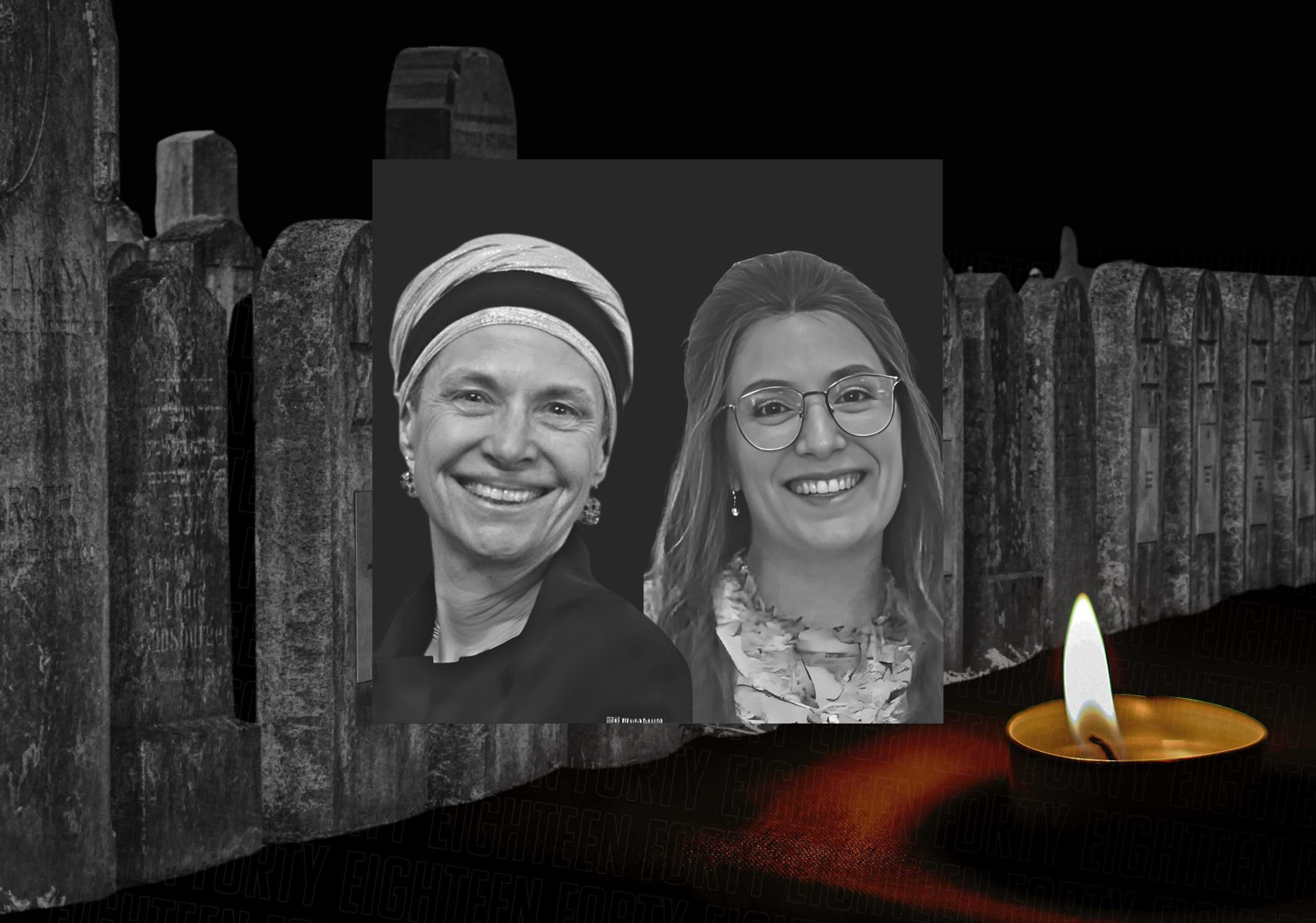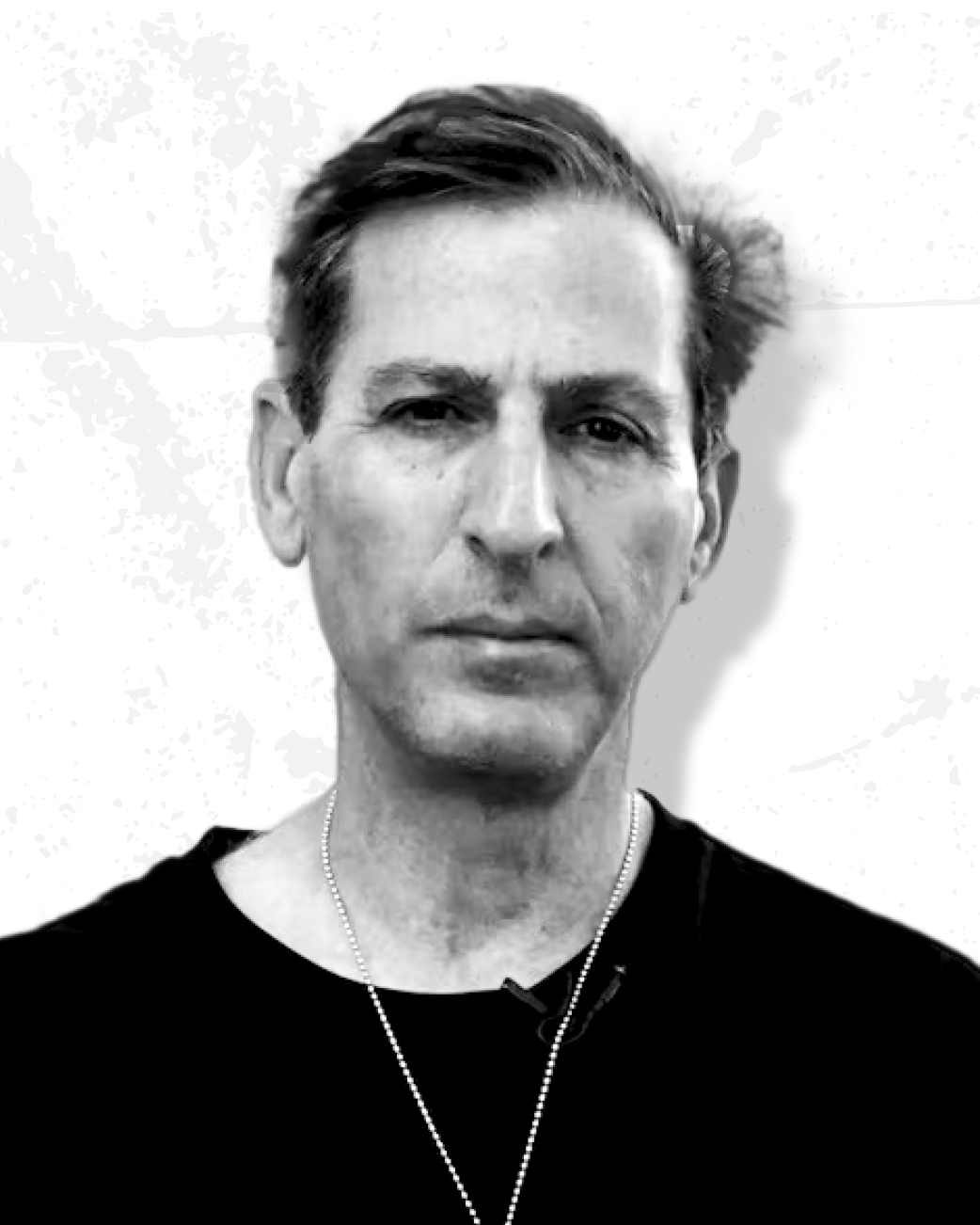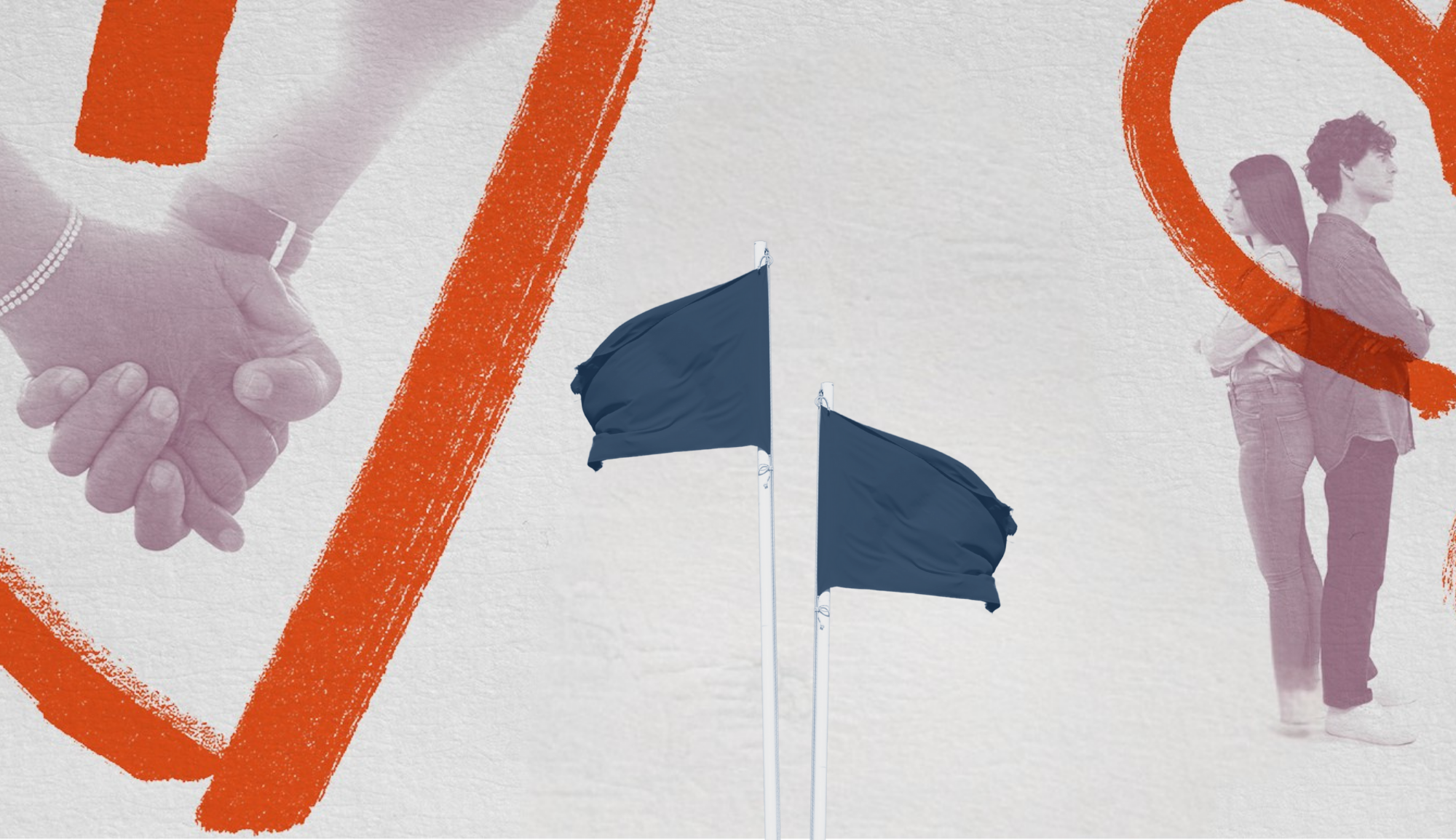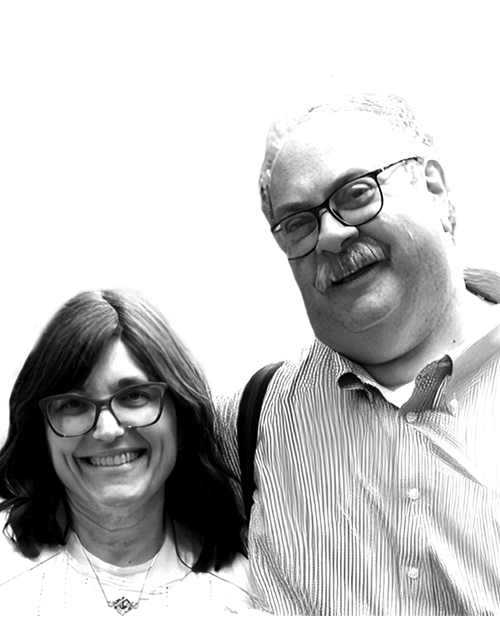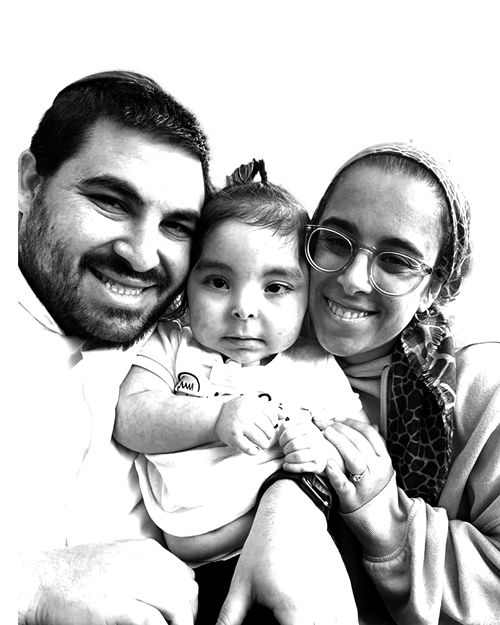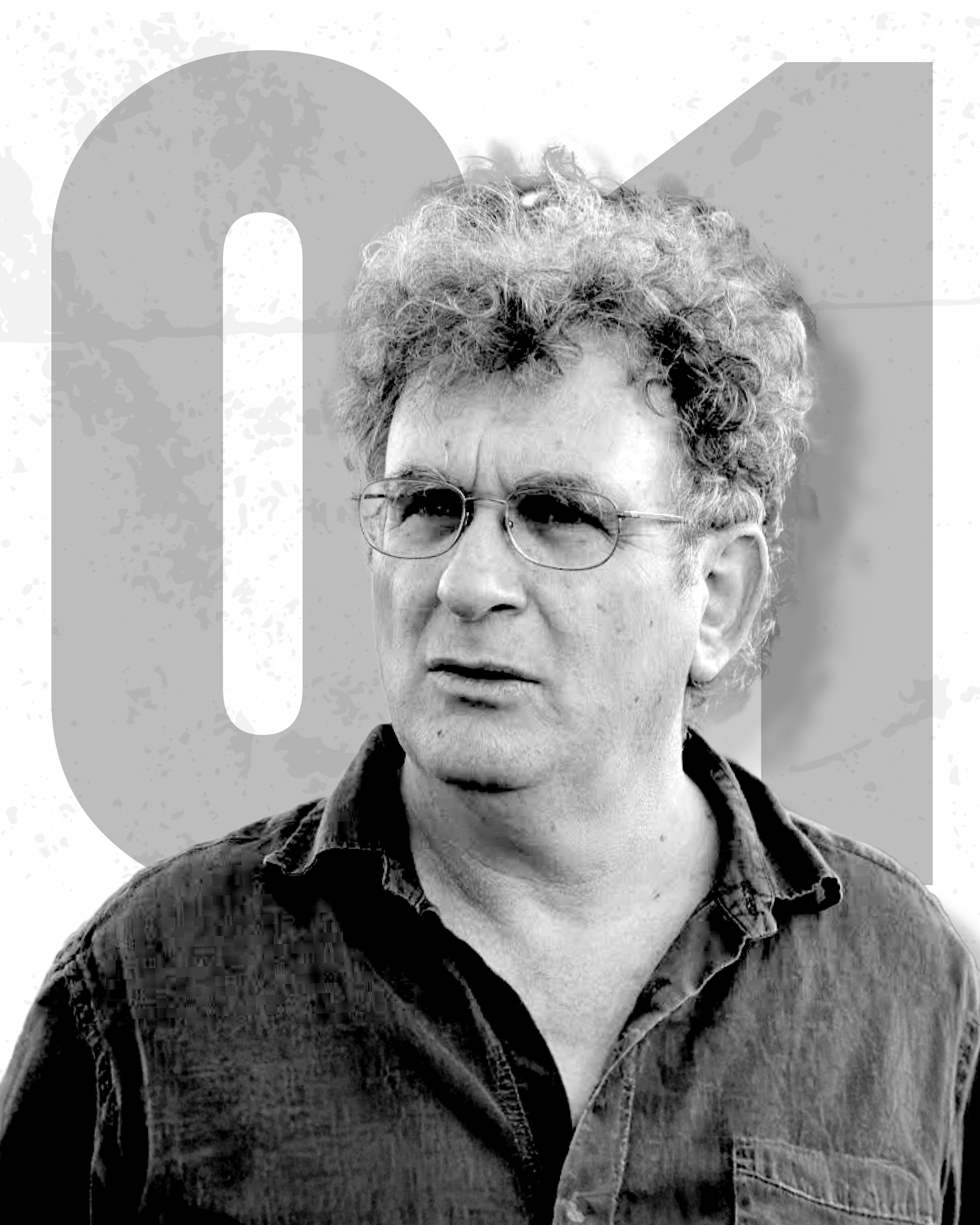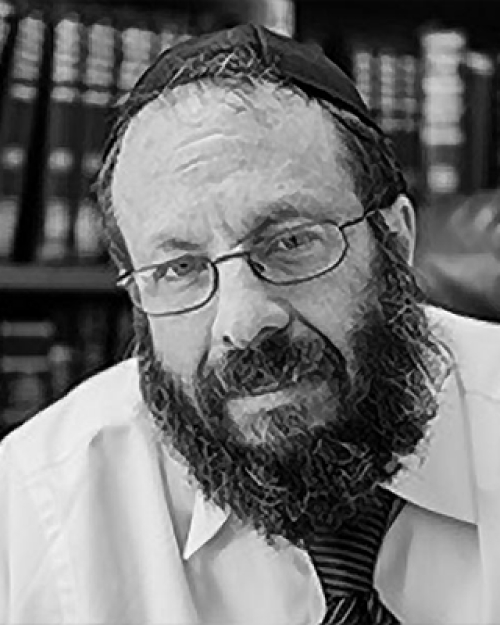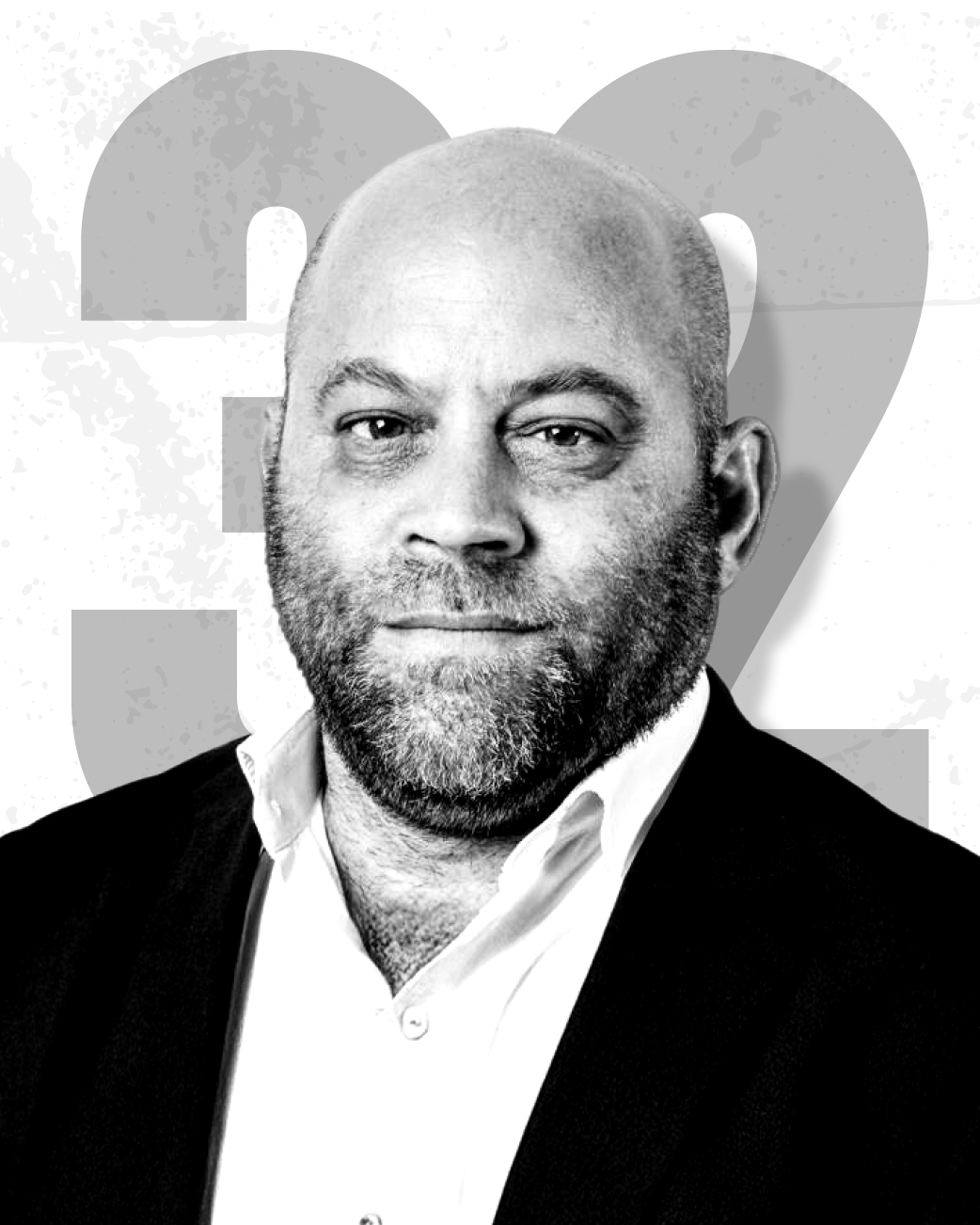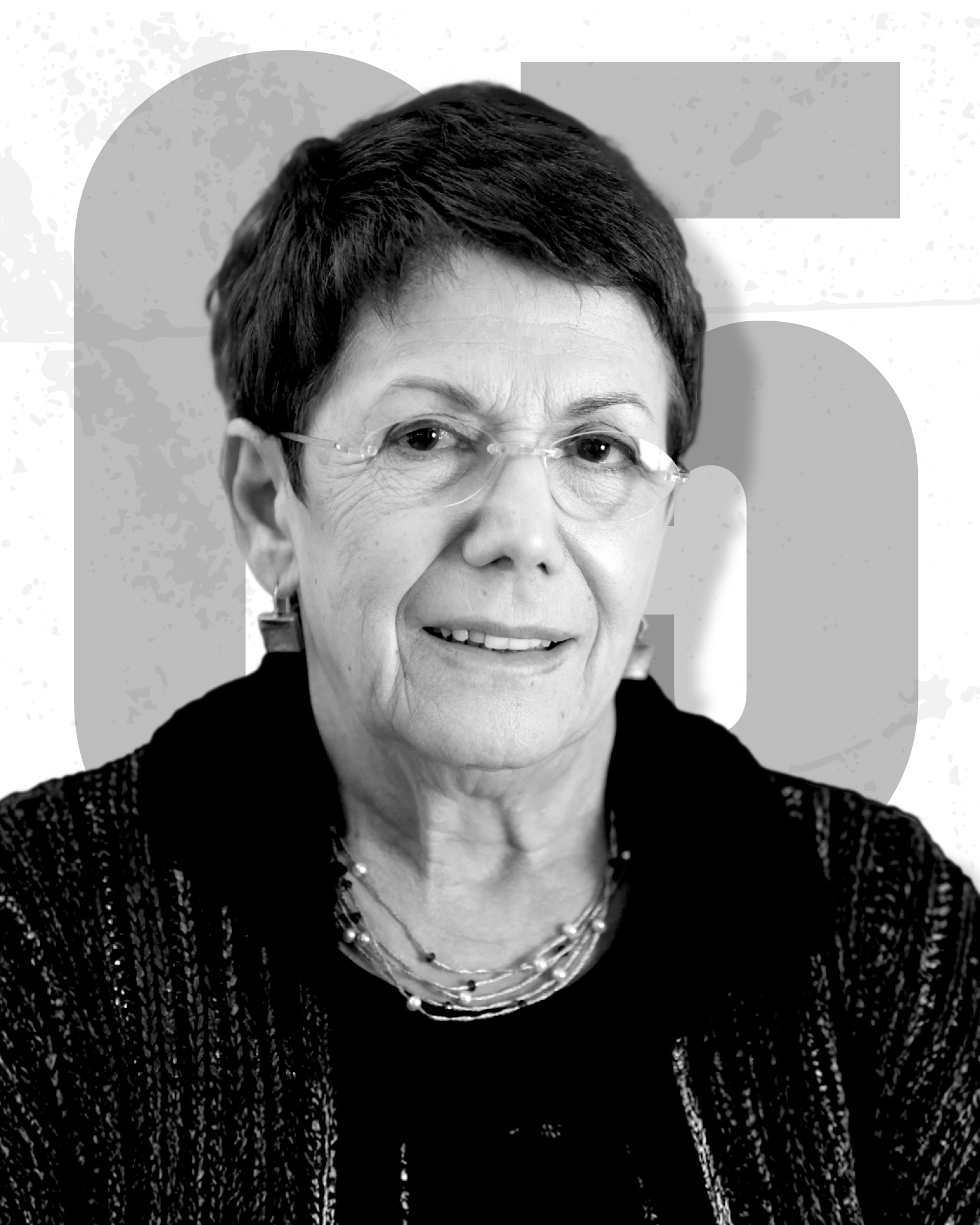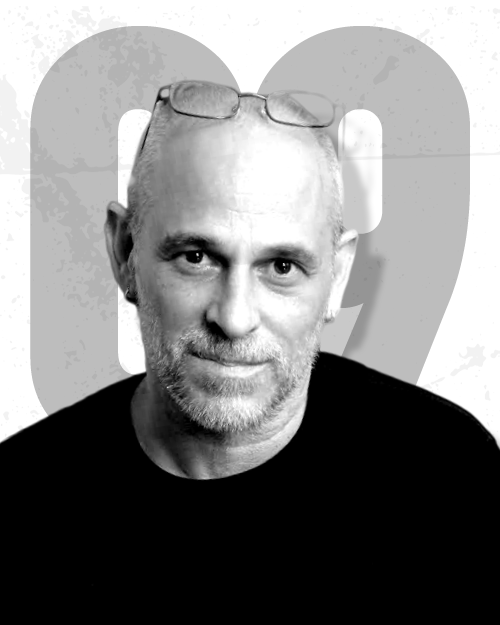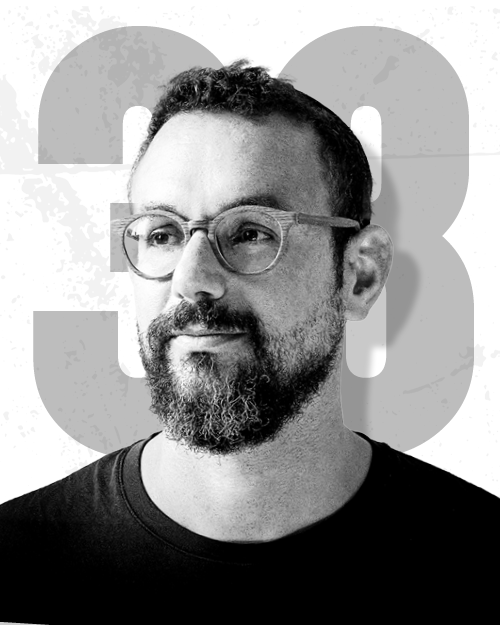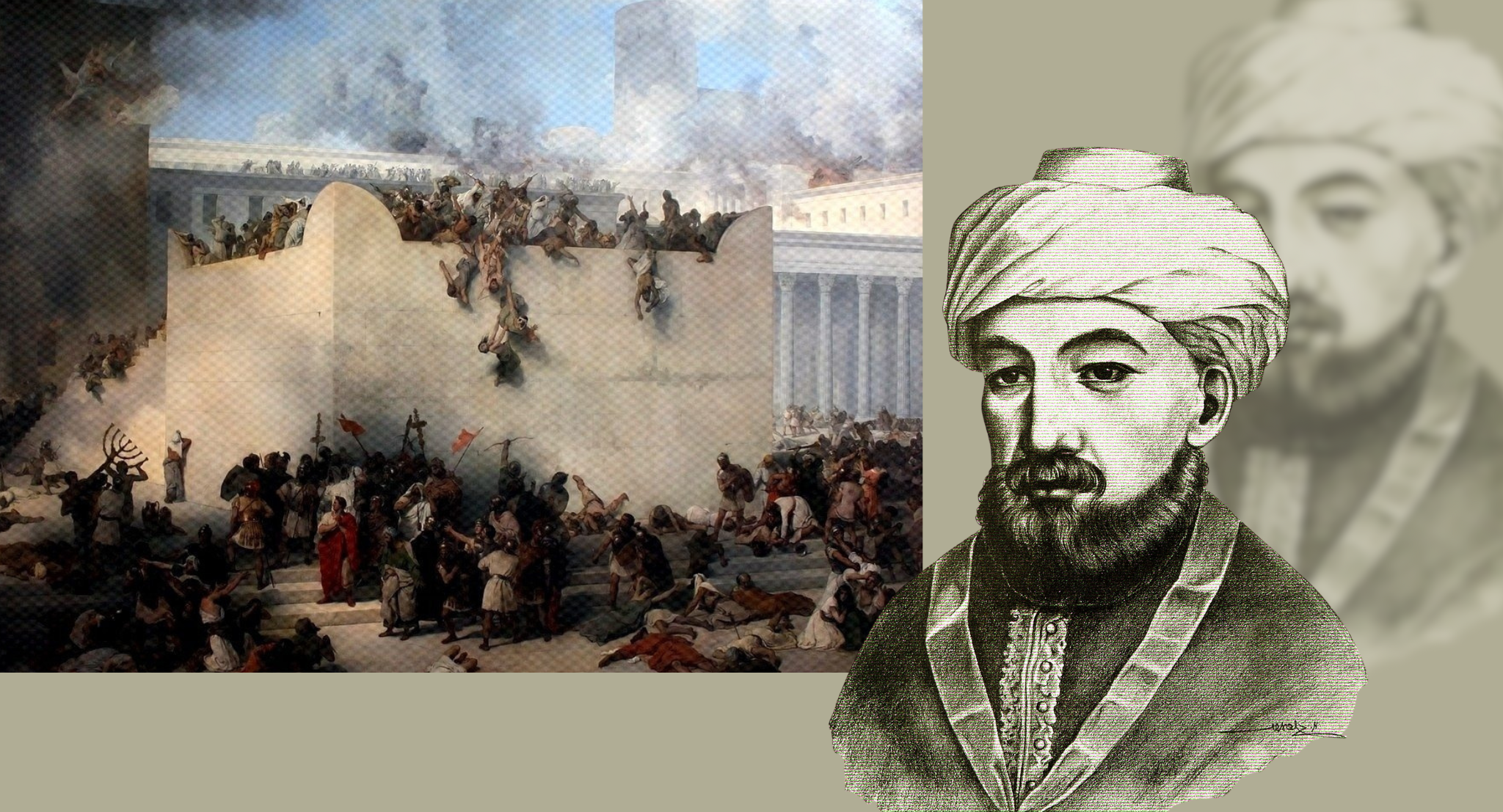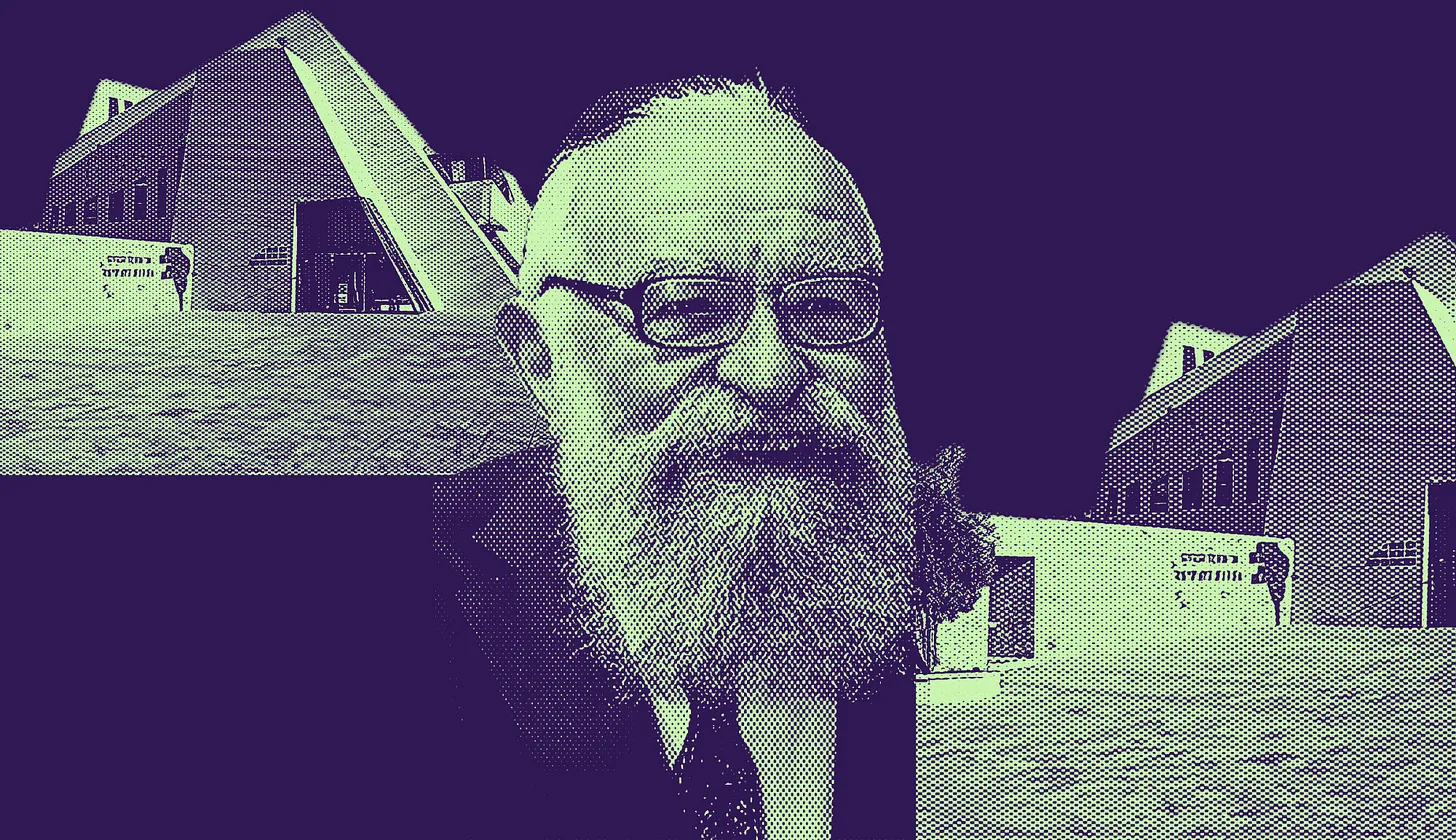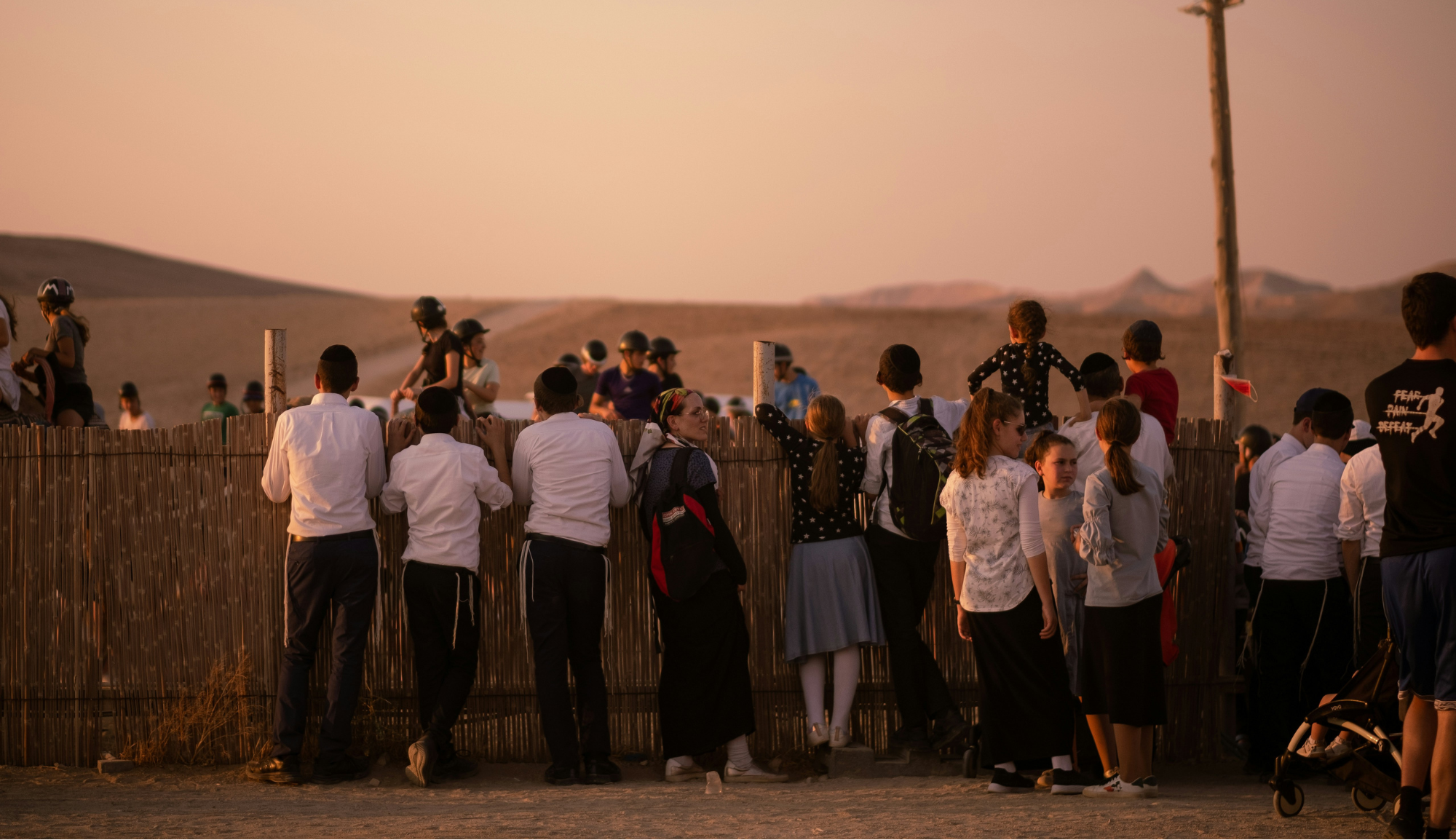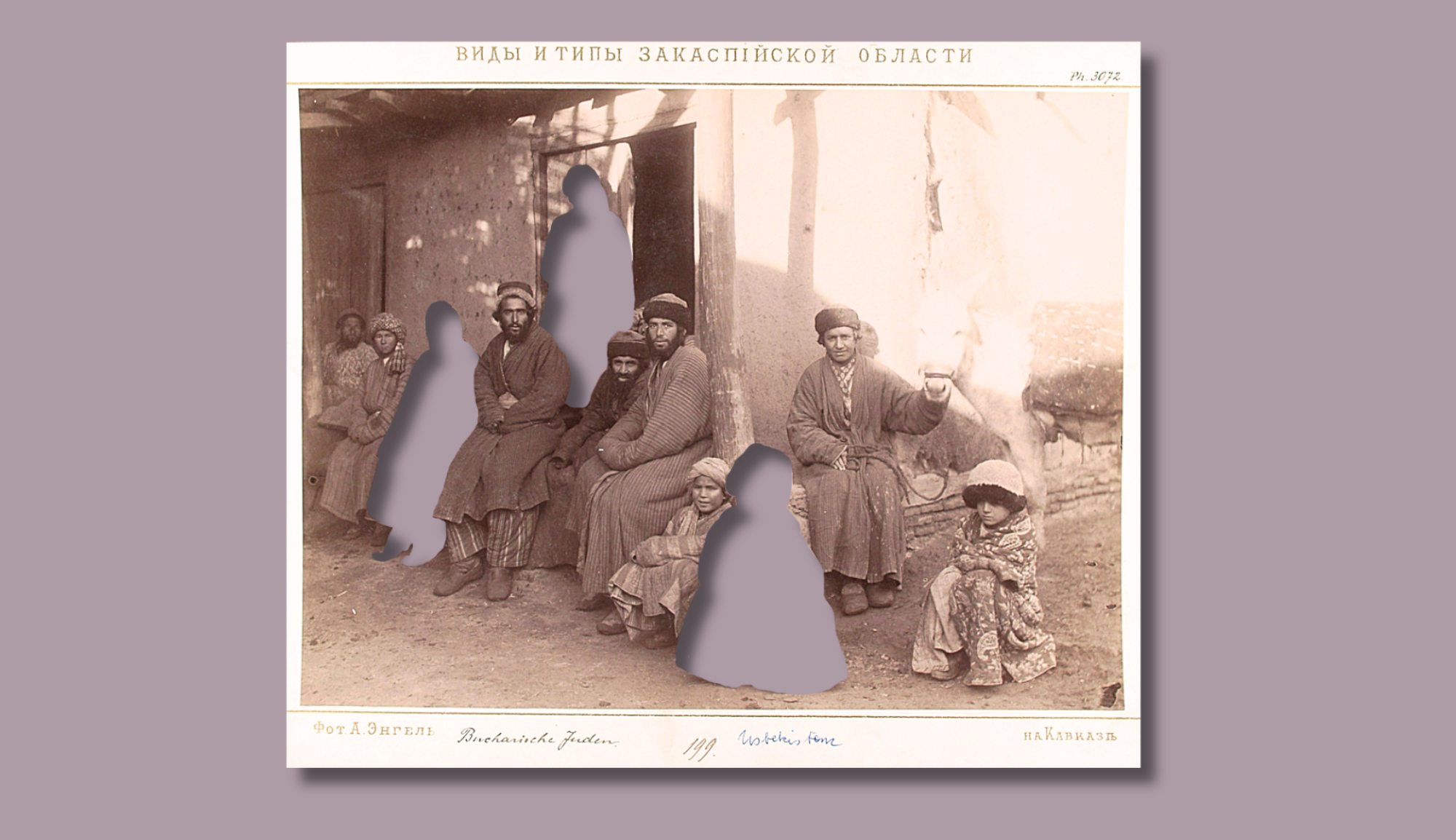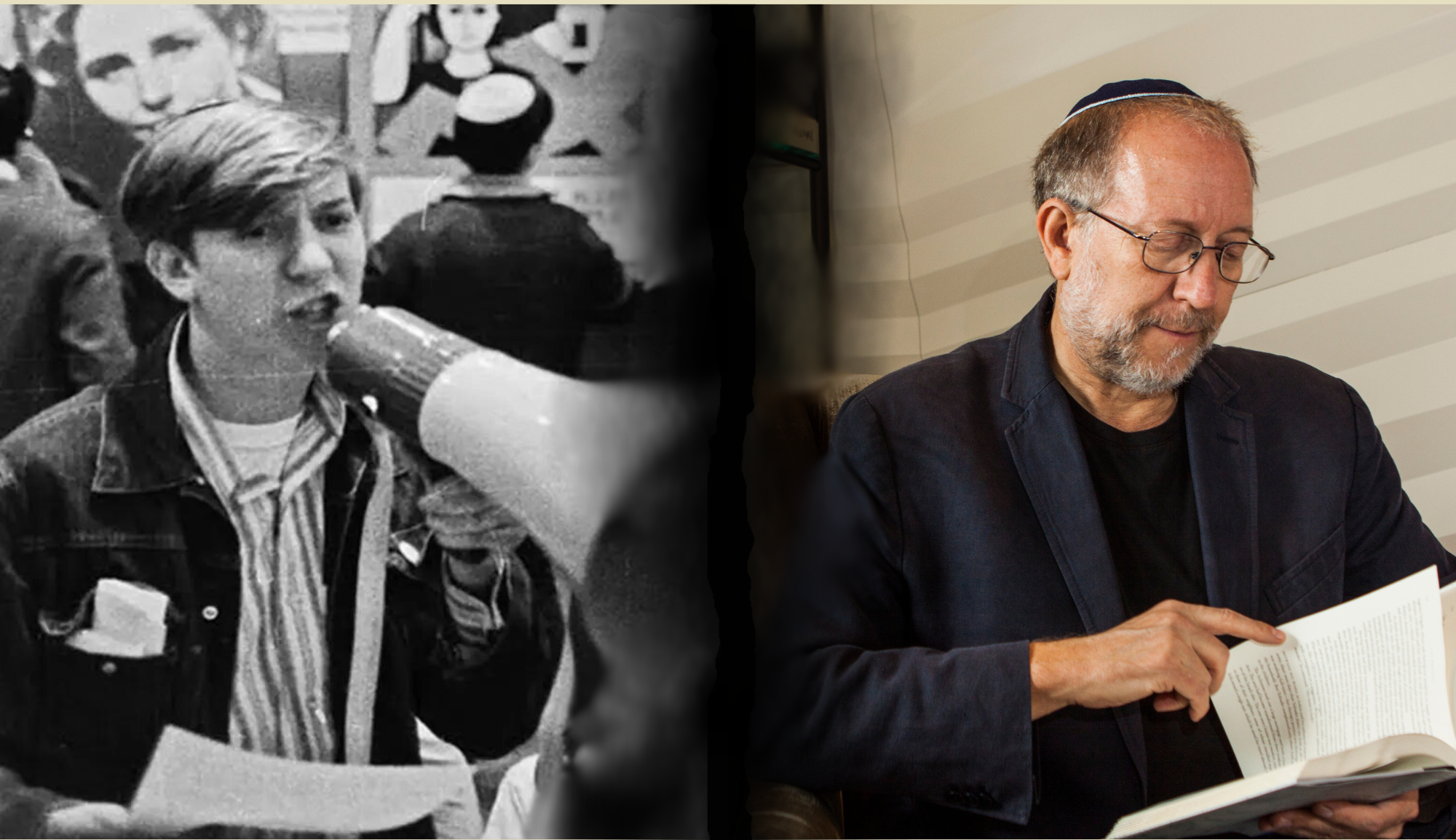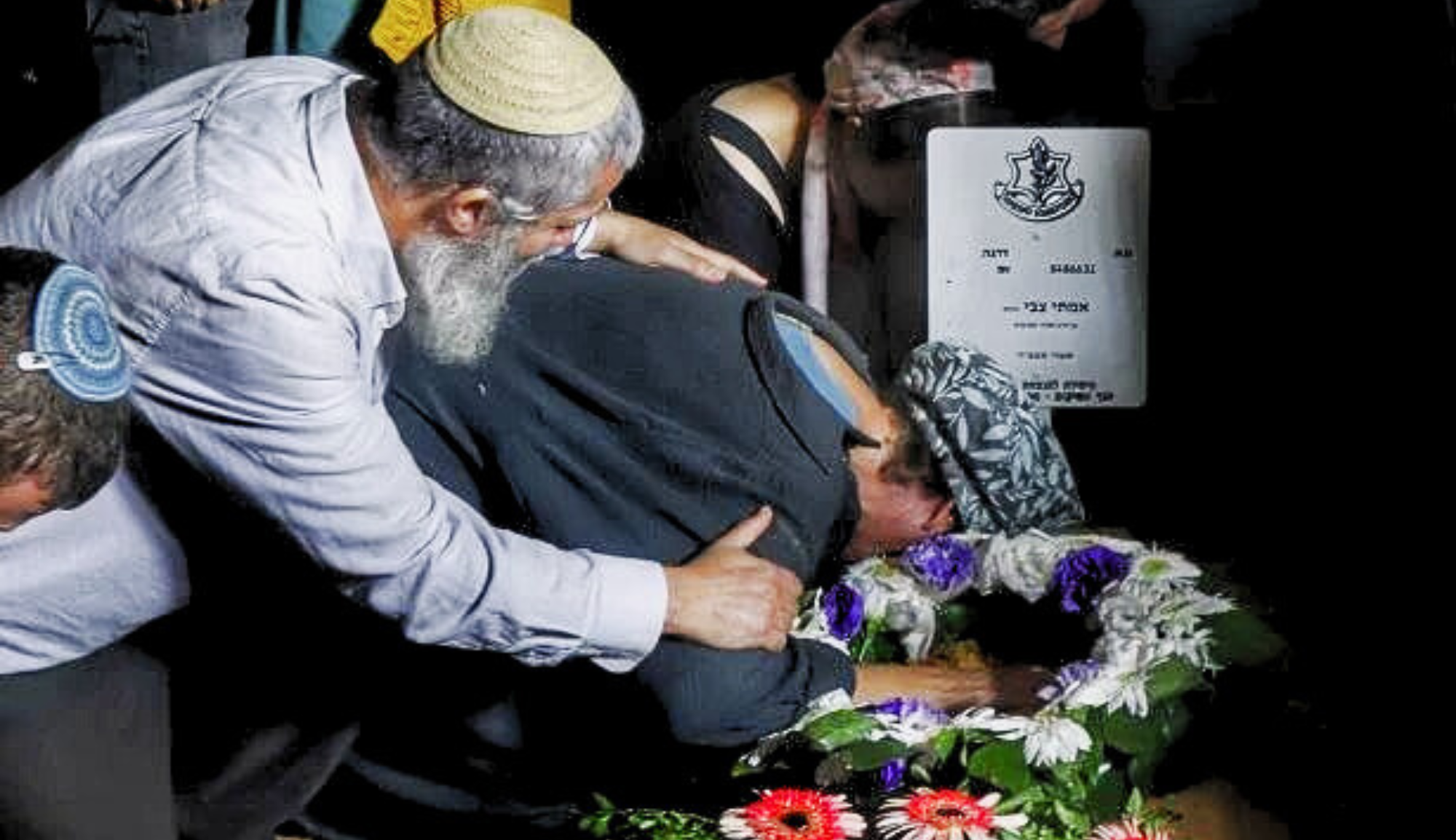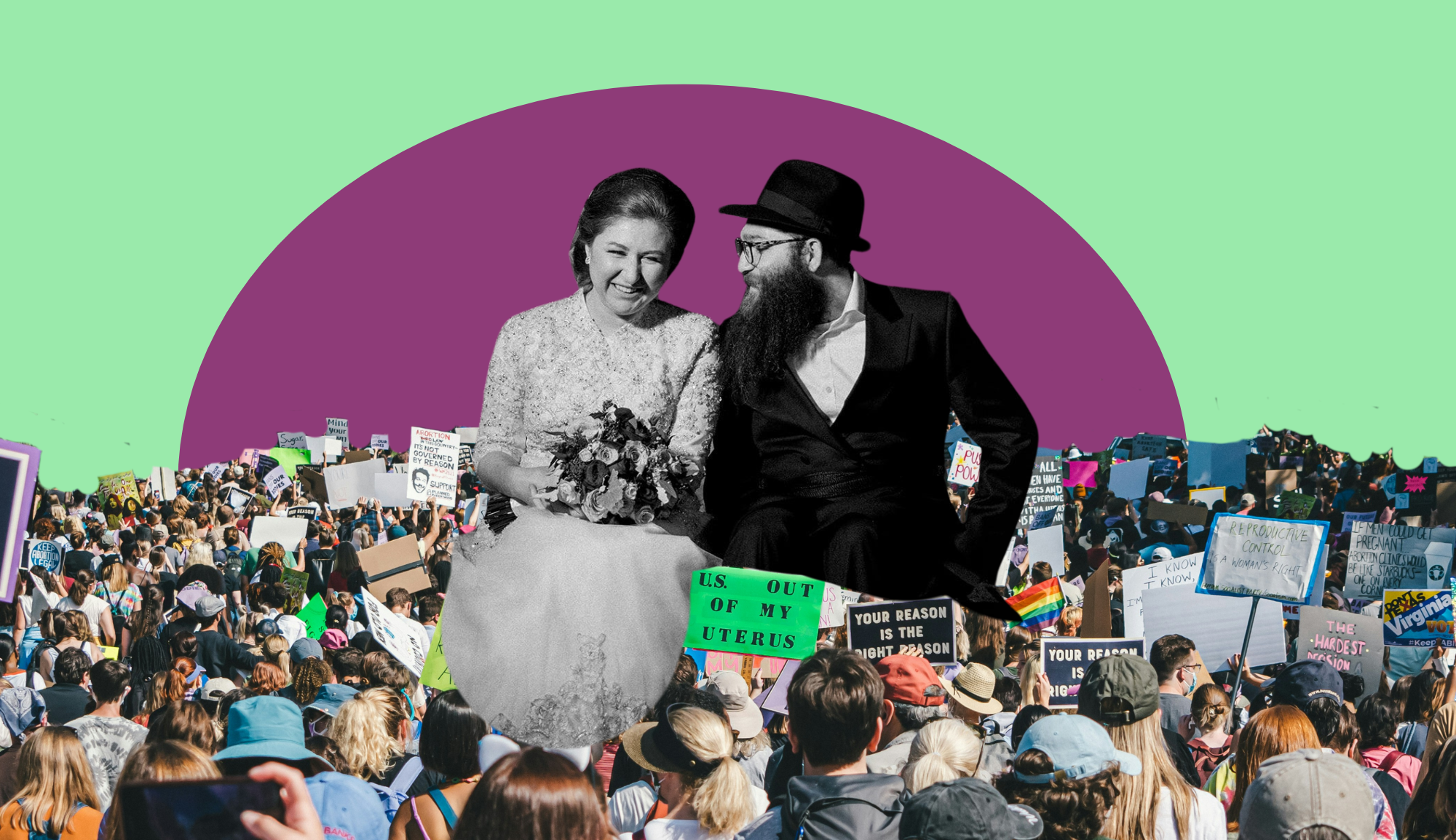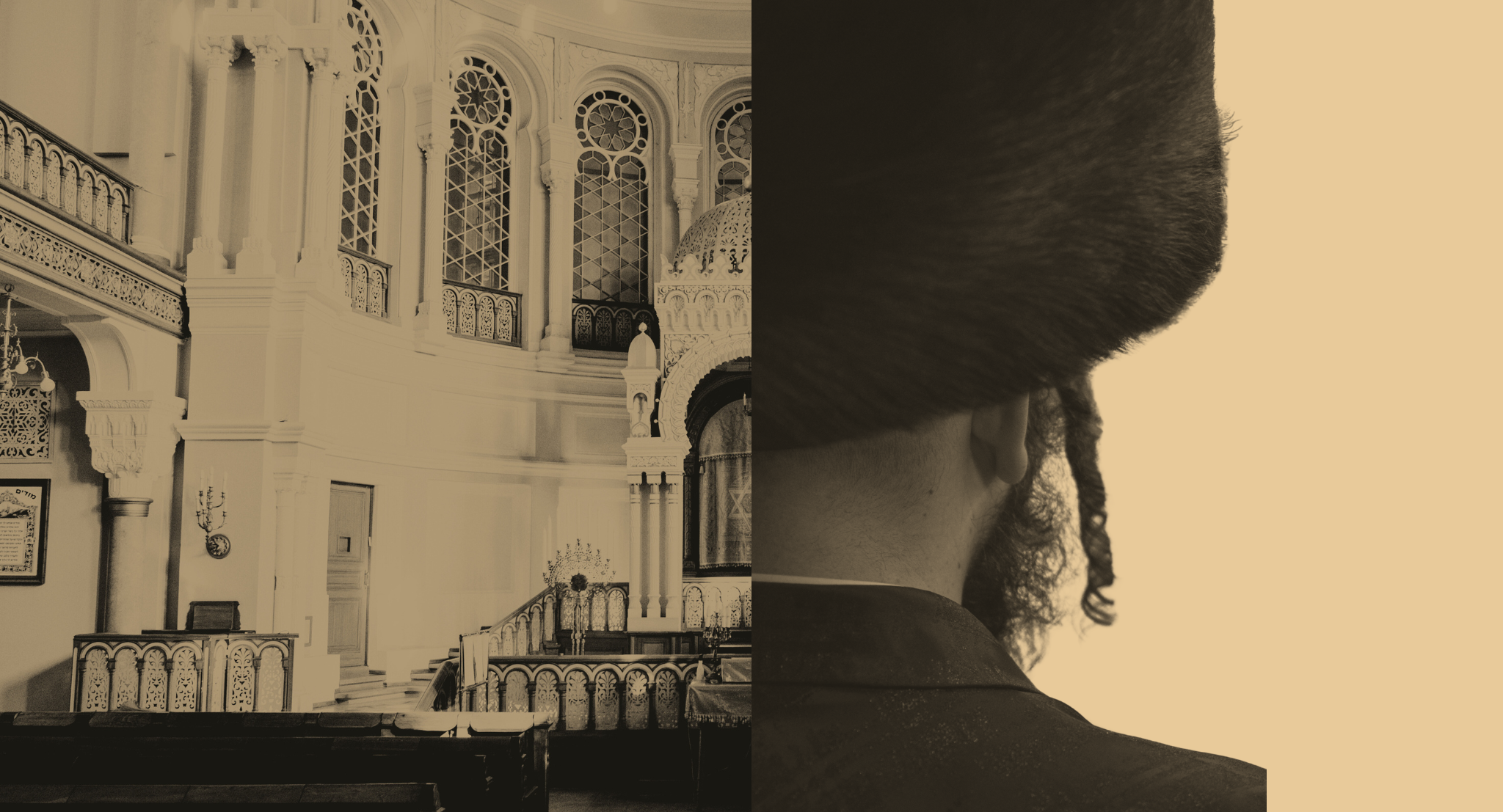Daniel Statman: Can War Be Moral? On Moral Philosophy and War
In this episode of the 18Forty Podcast, we talk to Daniel Statman, a professor of philosophy at the University of Haifa, about what it means to wage a moral war.
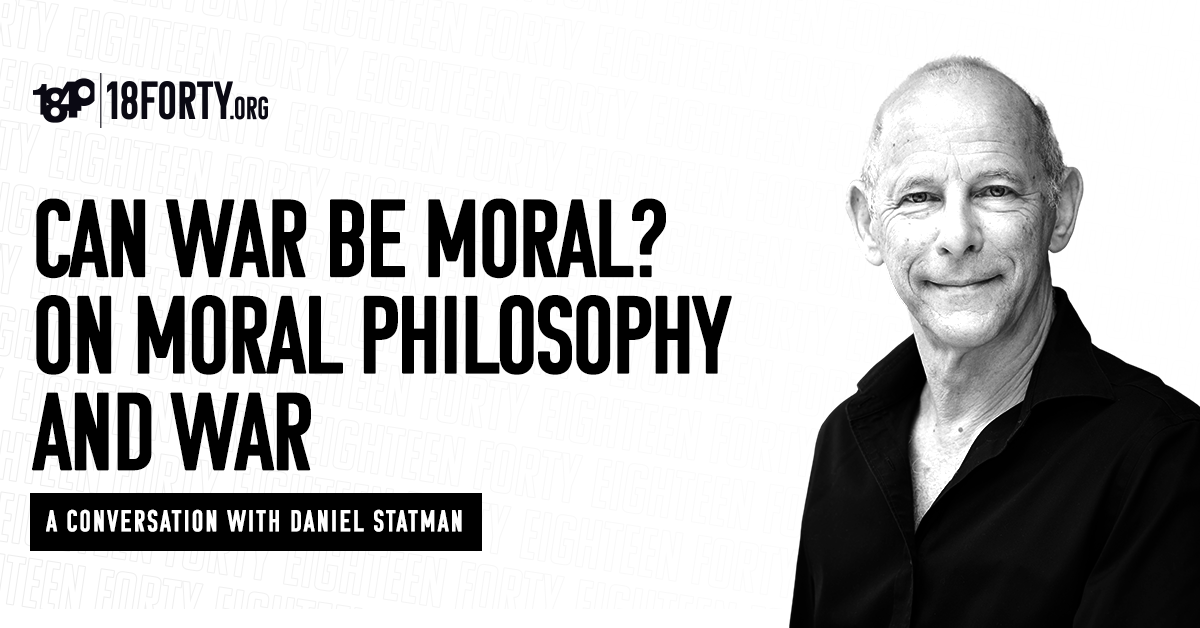
Summary
In this episode of the 18Forty Podcast, we talk to Daniel Statman, a professor of philosophy at the University of Haifa, about what it means to wage a moral war.
Professor Statman helped revise Ruach Tzahal, the IDF’s code of ethics, which outlines the values that determine what the IDF can and can’t do during a war. Understanding these specifics is vital in a time when there is so much at stake morally and the Israeli army receives so much (often uninformed) criticism. In this episode we discuss:
- How does an Israeli moral philosopher react to the recent terror attacks and their repercussions?
- What are the ethics of fighting a war in a civilian-populated area?
- What can Avraham Avinu teach us about restraint in battle?
Tune in to hear a conversation about the complexities of the permissions of war.
Interview begins at 10:46.
Daniel Statman chairs the philosophy department at the University of Haifa, Israel. His recent books are State and Religion in Israel (Cambridge 2019, with Gidi Sapir) and War By Agreement (Oxford 2019, with Yitzhak Benbaji).
References:
Homegrown: Timothy McVeigh and the Rise of Right-Wing Extremism by Jeffrey Toobin
Just and Unjust Wars by Michael Walzer
War By Agreement by Yitzhak Benbaji and Daniel Statman
Remarks by the President at the Acceptance of the Nobel Peace Prize
“War Is a Very Ugly Thing but Not the Ugliest” by Dov Lerner
Transcript
David Bashevkin:
Hello, friends, and welcome to 18Forty, another special episode where we’re exploring the war happening in Eretz Yisroel, in Israel. Of course, if you are interested, you can find out more of our work on 18Forty.org, or sign up for our weekly emails.
The first time I remember a terrorist attack, I was in fifth grade. I’m pretty sure it was in 1995. I believe I was in Mrs. Shaetoff’s class, and I still remember the Oklahoma City bombing that was perpetrated by Timothy McVeigh, and his partner Terry Nichols. One of the reasons why I remember it so well is because Newsday ran a program where they asked children in elementary schools to react to what had happened. It was really unfathomable. I mean, I was in fifth grade, I’m sure I was alive perhaps for other terrorist attacks. It’s the first one I remember, and we spent a day writing about how our lives were going to change following the Oklahoma City bombing.
It seems so distant. We were allowed to submit all of our potential imaginings of how this would impact and affect our lives, and the best ones would get published, I believe, I’m 99% sure, in Newsday, which was a daily newspaper. I’m pretty sure they still publish. And there were two things that I really remember that emerged from this. Number one, a student in my class actually kind of “won.” I’m using air quotes, I don’t know if it’s called winning, by sharing reflections after such a terrible deadly attack killed 168 people. Famously, there was a childcare center inside of the Alfred P. Murrah Federal Building, which was the subject of the Oklahoma City bombing. And babies, babies were—nebach, lo aleinu—babies were killed.
And I remember that one of the students in our class, I believe it was two, but I only remember the name of one person, was actually published in Newsday. And it’s not insignificant about who won. The winner in the class. His name is Motti Gottlieb, I believe he’s a lawyer in Long Island now. We grew up together. I know for sure that he was one of the responses that were printed because in his kitchen his mother hung up his response and it must’ve been hanging there for at least five to 10 years after this took place. I remember seeing it in high school and Moti Gottlieb’s response was fascinating and I was thinking about it now.
He won be
cause he was right. He wrote about the security measures that would now be necessary when traveling on airplanes, when going through security into major areas. He says, “This is going to affect the movement and how we kind of interact as a society. We’re going to be seeing a lot more metal detectors.” Now, I don’t think it’s a coincidence that Moti, Gottlieb’s parents, Eli and Linda are both Israeli.
And I’m thinking back on it now that we had a whole class and everyone was writing probably more emotional things. And Moti, probably coming from a home that knew very well about what it means to change security and react to terrorism, kind of gave a very almost logistical a practical answer. This is going to affect our lives in very real ways. How do I know this? Because my parents grew up with this reality. My parents know this reality firsthand, and I was very struck, and I continue to be struck that of this entire fifth grade class in Mrs. Shaetoff’s class. The one person who really understood the impact of terrorism, even in fifth grade, was the child of Israeli parents. Somebody who really understood how war, terrorism really affects the day-to-day life.
And the other issue that I was thinking about reflecting on my first experience with a terrorist attack, which I think for a lot of people talking to your children, this is definitely a first. My son came home and he’s asking me about the war. He knows something is happening. Obviously he doesn’t have the emotional capacity to really know the horrors of what transpired, but this is going to be a memory for a lot of children of the first time that they were introduced to the horrors of terrorism and of war.
And the other thing that I remember, and this is especially given the fact that I don’t know that I’ve done deep, deep research on the Oklahoma City bombing, but there is recently published a fascinating book by Jeffrey Toobin, somewhat disgraced author from The New Yorker. But he really writes an incredible legal analysis. He’s probably most famous for his book on the OJ Simpson trials. And he wrote a book called Homegrown: Timothy McVeigh and the Rise of Right Wing Extremism. And the reason why I’m thinking about that book and the thing about this incident, is Timothy McVeigh was extraordinarily clear about his motivations for the terrorist attack.
Yet again, I was only in fifth grade, but if my memory serves me correctly, the upswelling in the United States of America, certainly in higher education, certainly in society, no respectful person would be seen marching in support of McVeigh’s motivations. And he had very real motivations that he detailed. Motivations that date back to the standoff at Ruby Ridge. Motivations that date back to the Waco standoff, motivations that date back to what he felt was government overreach, which is why his last words were from the pretty famous William Ernest Henley poem, “Invictus,” where his final words that Timothy McVeigh uttered was, “I am the master of my fate. I am the captain of my soul.”
He felt he was very justified in committing this terrorist attack. He was very, very cold about it and he felt he had very real reasons why he would perpetrate such a deadly, horrific attack on American soil. Yet sadly, so much has changed in the nearly 30 years since that terrorist attack. And it seems you look around and there are people, dignified people so to speak, people with educations, people in positions of power, people in leadership positions who, their first reaction, their initial reaction and continuing to this day is not one of mourning, not one of horror of the terrorist attack, but one that initially is saying, “Let’s figure out why this happened. Let’s figure out the justifications. Let’s explore why this was justified.”
And there’s something very painful about living in a time where you can see, so to speak, decent members of society in higher education and positions of power, who their first reaction to a terrorist attack is kind of this analysis of the motivations as if something so horrific, so heinous can even be justified. And it almost pains me to have the conversation that we are having today, but it is an extraordinarily important conversation, and it’s one that we should not be afraid to have, and that is a conversation about morality and war itself.
There is this kind of surge in American thinking. You see it all over the place in op-eds, in essays, in think pieces, that automatically when there’s an act of terrorism, war should be avoided at all costs. And underlying much of this very often is the feeling that there is no way, there is no such thing as morality in times of war. And that is why I think it is so important to really understand from the viewpoint of a moral philosopher specifically of war, to understand what goes into the thinking. How do you understand, how do you justify an act of war in response to terrorism?
This episode may not be for our listeners, but it may be to equip our listeners with the language to really understand and perhaps explain to people around them who are wondering, who are coming and trying to figure out what is happening, to understand what are the calculations? Is it in fact possible to analyze war through the lens of moral philosophy? And that is why it is such a privilege to speak to somebody who is really instrumental in this line of thinking. And that is Professor Daniel Statman, who happens to be a first cousin to probably my oldest friend, Yoni Statman, who was in that very fifth grade class. I don’t believe his response was published. That honor only goes to our friend Moti Gottlieb.
But Professor Daniel Statman was involved in something that is really important to highlight today, and that is, aside from being a lecturer/ writer in the field of moral philosophy in times of war, he was on the committee that drafted the current IDF Code of Ethics. If you Google and you can and should Google Ruach Tzahal in Hebrew, Ruach Tzahal is the Code of Ethics of the IDF, but it begins, the Ruach Tzahal or the Spirit of the IDF of the military of Israel:
The Israel Defense Forces is the military of the state of Israel. Its actions, and this is directly from the IDF website, its actions are subject to the authority of the Democratic Civil Government of Israel. The purpose of the IDF is to preserve the state of Israel, to protect its independence and to foil attempts by its enemies to disrupt the normal life within it. The soldiers of the IDF are obligated to fight and devote every effort, even at the risk of their own lives, to protect the state of Israel, its citizens and residents. Soldiers of the IDF shall act according to the values of the IDF and its commands while abiding to the law, upholding human dignity and respecting the values of Israel as a Jewish and democratic state.
Our conversation with Professor Daniel Statman explores not only the Code of Ethics of the IDF, what went into drafting it, why was it drafted, but really explores from first principles, what does it mean to wage a moral war? Does such a thing exist? And I think especially today when so many are comfortable questioning, when so many are comfortable digging down and thinking, well, what are the underlying issues? And not, instead looking at the atrocities that were committed on innocent civilians in the land of Israel, where it seems that openly the moral reasoning of society has deteriorated considerably since I first experienced the news of a terrorist attack almost 30 years ago.
I think now is as an appropriate time as ever to explore moral philosophy and war. It is our privilege to introduce our conversation with Professor Daniel Statman.
I wanted to begin with a question, a more general question, not even specifically about what we’re seeing now before us, about how philosophers think about morality in the context of war. And let me just flesh out the question. Most people can agree that murder is immoral. All of our moral intuitions come to the fore. All of our preconceived notions philosophically come to the fore. And I was curious in the context of war, a lot of that goes out the window because you are in a situation where you want security. You want to make sure that there is a resolute focus. So help me begin with how do philosophers think of morality within the context of war?
Daniel Statman:
You laid the problem very nicely because precisely because we have these very strong intuitions against murder, precisely because of that war becomes very problematic from a moral point of view. We’re talking about killing on a very mass scale, killed thousands of more human beings. Many of them sometimes are clearly innocent civilians. This is just part of the game. This is what happens in our wars. So the big question is how can this enterprise at all be morally justified?
David Bashevkin:
Correct. In any context. It’s almost a contradiction in terms to talk about morality and war. You have to suspend it. How do you build a bridge to talk about morality within the context of war?
Daniel Statman:
Precisely, and this notion of a just war, people say you must be joking. This is an oxymoron. A war can’t be just, it might be necessary, but it can’t be just. Okay. So yeah. So indeed, first of all, some people respond to this big problem by saying that in some way, war lies outside the boundaries of morality. Yeah, this view is called moral realism in the context of war.
David Bashevkin:
Moral realism in the context of war, meaning you have moral structures of right and wrong, but once a war begins, all bets are off. That’s this approach.
Daniel Statman:
Exactly. Exactly. Now, it’s not very easy to defend this approach. One possible defense would be to say that morality gets off the ground only when we have free choices. Right?
David Bashevkin:
Interesting.
Daniel Statman:
But when we are at war, this is the realm of necessity, the real necessity. We are forced to be there. We are forced to do things we wouldn’t do otherwise in our real life out there. That’s why in some sense, moralism doesn’t at all apply.
David Bashevkin:
Because it’s the suspension of free will and both the soldiers and the people involved in a war, they’re in a situation that they didn’t choose. Nobody decided, oh, what are we doing this morning? Let’s go to war. So this approach, which again you’re calling moral realism, is that we suspend any moral hierarchies or lens in the context of war because there is no free choice where we are required to be in this situation. So moral judgments don’t really apply in this context.
Daniel Statman:
Right. This follow from a central ethical principle, which is ascribed to Kant, which says, “Ought implies can.” Okay, ought implies can. So the idea is that it makes sense to speak about what we ought to do or we ought not to do only if we can’t do what we’re talking about.
David Bashevkin:
If you’re not forced into it. But if you’re forced into a situation, you can’t talk about what the ideal should be because this is not an ideal situation to begin with. So ought implies can. That’s a very digestible way of thinking about it.
Daniel Statman:
This approach, it is attractive, and you can hear it from people who never studied philosophy. They say things like, “Don’t be a child, we are at war now.” And they mean by that, forget about the usual moral constraints because we are at war and we are kind of a different domain, a different realm. Okay, now, attractive as this position is, I think it’s very hard to really defend it because you think of a soldier or an officer who has to make a decision whether or not to take some course of action, which is going to seriously harm civilians or kill many civilians. Now the officer or the soldier are now contemplating what to do.
The very fact that they have this dilemma means that they’re not forced to do anything right now. It’s up to them. So the decisions of soldiers, officers during war, and obviously the decisions of politicians to go to war, to continue the war, to stop the war, all these are a matter of human decision, human contemplation, and then human decision. So it’s really hard to accept this thought that whatever politicians do regarding war and what soldiers do within the war is just kind of forced upon them. I think it’s hard to defend with moral realism. So we’re back to square one. I mean, given that wars involve so much killing and destruction, so on however, could they be moral justified, right?
David Bashevkin:
Exactly.
Daniel Statman:
One answer would be, you know what? You’re right. They can’t. They just can’t be justified. And that view is called pacifism.
David Bashevkin:
Pacifism. That’s like John Lennon. Imagine all the people …
Daniel Statman:
Exactly.
David Bashevkin:
There’ll be no war, this utopian society. Let’s all get along. But pacifism to me is also untenable in the face of the horrors of life, the horrors of terrorism, the horrors … you can’t get attacked and then turn on … I remember right after the coronavirus started, so the coronavirus was not the product in a more literal sense of one person attacking another. It was a virus, and there was this response, but let’s play John Lennon’s song, imagine. Imagine all the people. It’s very kumbaya. We’ll all be together.
There are writers like Kurt Vonnegut, who from the horrors of war said, “Let’s just try to avoid this,” which is a sentiment that I think everybody agrees to, except after you face a terrorist attack, until after the horrors of life rear its head again, it’s impossible to be a pacifist. Pacifism to me feels also morally untenable. No? How would a moral pacifist deal with the moral consequences of pacifism? How can you look at an attack and hostages or whatever it is, and advocate, “Let’s be passive. Let’s kind of relax ourselves. We don’t need to respond. We don’t need to bring more war. We’ll send a goodie basket.” How would a pacifist respond to that?
Daniel Statman:
Yeah.
David Bashevkin:
You’re not a pacifist, but I am looking to understand how do they respond to that very basic charge of like, isn’t pacifism morally repugnant?
Daniel Statman:
Okay, so although I’m not a pacifist, pacifism can be presented in a more charitable way, okay?
David Bashevkin:
Let’s hear.
Daniel Statman:
They’re not necessarily kind of lunatics. The first response would be to say something like this. Look, there’s some things you’re just not allowed to do, okay? You’re not allowed to kill, for instance, an innocent person in order to save your own life or the lives of your children or friends and so on. Okay?
If the price is that you’re going to die or your friends are going to die too bad. So if you and your children and your friends all need transplant very, very urgently, and the only way to get transplant and live is to kill these innocent people and harvest these organs. So you’ll have to die. That’s life. You just can’t do that. So pacifists say that wars involve too much killing of innocent people. Of innocent people.
David Bashevkin:
You can’t. It’s a moral red line.
Daniel Statman:
Exactly. There’s an absolute prohibition on taking the lives of innocent people, even if the price is very high.
David Bashevkin:
That’s pacifism.
Daniel Statman:
Yeah. The second response of the pacifist is that what they’re recommending is not complete passivity. It’s not doing nothing. What they call for is non-violent resistance. Now, this might work with some regimes, not with all of them. So probably with the Nazis it wouldn’t have worked, but maybe with other regimes it would work. Okay. So let’s say one thinks that the Israeli occupation in the territories is unjust. Okay? And the Palestinians have a right to self determination and a right to undergo occupation. So maybe pacifist methods would work vis-a-vis Israel. Okay, I’m talking about strikes, hunger strikes, marches, stuff like that. Okay?
David Bashevkin:
In the States, a lot of the civil rights movement was couched in Martin Luther King Jr., in a non-violent resistance, and they still got arrested. They were still difficult, but they emphasized non-violent resistance. So you’ve staked out two approaches. One is moral realism, the other is pacifism. Is there a third approach that kind of weds morality with war itself? Because I know you have done work, and correct me if I’m wrong directly with the IDF and kind of helping them think through some of the moral issues that come up in the context of war. What does a moral philosopher tell an army?
Daniel Statman:
Okay, I do that right now, but first I just want to make a distinction between this philosophical discussion and the more educational project of trying to influence the behavior of the army. They might not be the same. What I mean by that is that sometimes we have some philosophical theory, which is quite nuanced and complex, and it might not be smart to walk in a classroom of soldiers or maybe doctors in whatever field and present all these subtleties, especially not the juniors. Okay, maybe high ranked officer or doctors. You can show that, let’s say for doctors, you want to emphasize don’t harm, don’t harm, don’t harm. You want to emphasize their complete devotion to the patients and so on and so forth. And with soldiers, we’d like to emphasize also some things, and we don’t want to complicate things too much. Okay?
David Bashevkin:
Correct. They’re soldiers. They’re not philosophers. So there are obviously going to be limitations. War in general, soldiers in general, those are not situations that individuals who are renowned for their philosophical nuance, it’s nearly impossible. You can’t give everybody a 20-page philosophical academic paper talking about ontology before war. So yes, I understand. We are deliberately talking conceptually right now, because I want to give language, to even have such a conversation to talk about morality because this is in the news and people are thinking about it and help people understand what are some of the concepts that animate and we should be animating our thought specifically during times of war. So give me a third approach.
Daniel Statman:
Sure. So the third approach is traditionally called just war theory. So just war theory is a theory about just wars.
David Bashevkin:
When you say just war, you don’t mean just war, that’s just as the word, the only thing that we’re doing. You mean just as unjustified war?
Daniel Statman:
Absolutely. Yeah, yeah.
David Bashevkin:
That we can feel a sense of moral confidence in it being waged.
Daniel Statman:
Absolutely.
David Bashevkin:
What does it mean to have a just war?
Daniel Statman:
Right. So this a long tradition, several conditions are met, then the war can be justified. Okay? They’re not always satisfied, but if they are satisfied, then the war is morally okay. You can go home from the war and feel more or less okay with yourself. Politicians can feel okay for taking their nation to war. Soldiers can feel okay for fighting the war, et cetera. Okay. Now we need to talk a bit more about these conditions.
David Bashevkin:
Before we get to the conditions can you give me just a little bit of the history of when this was developed? In what context? Where did the notion of a just war emerge from in the philosophical world?
Daniel Statman:
This starts in Thomas Aquinas in the Middle Ages. Then it was developed by different thinkers, especially in the Christian tradition.
David Bashevkin:
Just war theory predates the world wars. It predates World War I, by many centuries. Were Christian thinkers developing this in the context of the Crusades?
Daniel Statman:
No, no, no. It wasn’t necessarily in the Crusades. Look, we also have discussions in our own tradition about what you can do, what you can’t do.
David Bashevkin:
Correct, correct.
Daniel Statman:
Different sorts of war, milkhemet reshut and so on, milkhemet mitzvah.
David Bashevkin:
What are those conditions that they are looking to be met in order to have that sense of moral clarity and confidence that this is a justified war?
Daniel Statman:
Okay, so first of all, this very important distinction between two levels of discussion about the morality of war. One level is what they call in Latin, jus ad bellum, which concerns the very launching of war, the very going to war, and the other is jus in bello, which concerns the way wars are fought.
David Bashevkin:
One is starting the war, that’s again in Latin because I love a little bit of Latin. Starting the war is-
Daniel Statman:
Jus ad bellum.
David Bashevkin:
And the latter is called? Jus in bello.
Daniel Statman:
And that’s the tactics used within a war.
One concerns the justice of going to war, and the other justice of fighting the war.
David Bashevkin:
Okay.
Daniel Statman:
If you wish, you can say that in jus, in talking of the adjective, the war itself is just, unjust. In bello is an adverb. The war is fought justly or unjustly.
David Bashevkin:
Okay, very good.
Daniel Statman:
Okay. So according to the traditional understanding, these two levels are logically independent. So a country might go on a war justifiably, okay, let’s say because the country is unjustly attacked by its neighbor, okay? It’s clearly a war of defense.
David Bashevkin:
So it’s jus ad bellum. But then the way they wage the war could still be unjustified?
Daniel Statman:
Exactly. So let’s say they target civilians and so on, and the other way around. A country might go to war, which is unjust, but then fight it like gentlemen by the book, okay?
David Bashevkin:
Gotcha.
Daniel Statman:
This is supposed to be separate dimensions. So concerning jus ad bellum, the thought is that if it’s a war of self-defense, if your country is attacked, then you have a right to defend yourself. So you’re not allowed to go to war for some religious cause or to expand your territory or enrich your country and so on. But you are allowed to go to war to block an unjust attack against you. So that’s the ad bellum. The in bello concerns, as we said, the way you fight. And here there are several principles. The main principle is the principle of discrimination. That’s how it usually refer to the principle of discrimination, which requires maintaining a clear distinction between combatants and non-combatants. That’s the most important principle.
So when it concerns combatants, you have a sweeping permission to kill all of them. There are some exceptions, ambulances or maybe hospitals and so on. But in principle, you have a right to kill all of the soldiers of the other side. But regarding non-combatants, there’s a sweeping prohibition to kill any of them.
David Bashevkin:
My difficulty with that is in older wars, you read about the Civil War, you read about the Revolutionary War, you read about World War I, World War II, there was really a front of two armies. Everyone wore a very specific uniform and they were taking place, not always, but most commonly on battlegrounds that were not embedded inside of populations. Is there any way that moral philosophers kind of like update or think about how do you wage a war when the combatants are so embedded within a civilian population, especially that’s in the context now, does that automatically require that a moral philosopher of war is going to say, “Well, that now makes it impossible. You may have had a justification to go, but there’s no way to do this justly.”
Or is there a way to, even with the difficulty and knowing that, look, we need victory and we need to solve this. We need security for our civilians, and this becomes very difficult because to discriminate in such a densely populated civilian area, you imagine, God forbid, if there were terrorists hiding out in skyscrapers in New York City, it would be impossible, but you know you need to resolve this. So how does a moral philosopher think about morality when the combatants are so indiscriminate among the civilian population?
Daniel Statman:
Okay, so this has to do with a second principle. So the first principle was you are never allowed to target civilians, but we should be more accurate. You are never allowed to target civilians directly or intentionally. You are however allowed, you have a right, to harm civilians indirectly or collaterally. You can do that. Collaterally killing civilians is okay, provided that the harm to civilians is proportionate to the military value of the attack.
So let’s say there is this remote post of your enemy, which isn’t that important, but it is a legitimate military attack. But attacking it, you can foresee that it will probably bring about the death of, I don’t know, 50 civilians. So that seems disproportionate. If however, you are attacking your enemy’s headquarters, then 50, maybe a hundred, maybe 200 dead civilians might seem, okay. All right. So the principle is not that you can never bring about the death of civilians, that’s not the principle. The principle is that you can never do that intentionally.
So what we see in recent war, at least fought by more or less decent armies, they never attack civilians directly. They do attack military targets, military targets can be enemy combatants, could be places where they hide rockets, whatever, knowing that there’s a good chance that enemy civilians would be harmed.
David Bashevkin:
I really have two questions just to rewind, just to understand because it’s such a fascinating area of philosophy, it’s a subcategory of philosophy, which is moral philosophy and a subcategory of moral philosophy, which is the moral philosophy of war, which I can’t imagine is a massive community.
My first question is, you had mentioned Thomas Aquinas. I’m curious what compelled the founding of this area of thought? What were they responding to that they said, “You know what? We need to kind of figure out these principles.” Was it the horrors of other armies that propelled certain moral philosophers to think about this? What was going on in the world? What were they coming to respond to that they developed this area of philosophy?
Daniel Statman:
To be honest, I don’t know enough about the history of just war theory. I would just say that for me, it sounds perfectly logical that societies from maybe the beginning of history saw the advantage of keeping some kind of separation between the battlefield and the civilian population. In some places there was total war where in the end of war everybody is either massacred or sold to be slaves. But in other places, people saw the advantage of having some kind of rule to regulate this activity, which would allow, on the one hand some kind of effective self-defense while on the other would use the horrors of war.
David Bashevkin:
I imagine there are conferences that have professors from around the world involved in the moral philosophy of war. Predominantly in the field is there any, not even consensus, but are there trends? I would imagine that most people who dedicate their life to teaching philosophy in a higher education do not feel a kinship with the idea of just war theory. My guess of the little I know about higher education is that they tend more to pacifism or war is not something that professors in general have ever championed.
So I’m curious to hear a little about inside the field of this subcategory of moral philosophy, and secondly, I’m very curious about if you’ve gone to conferences, you’re affiliated with an Israeli university, do you find yourself constantly having to, so to speak, defend? Do you have an outside voice when you’re at these conferences trying to present or give some language or understanding of Israel’s role vis-a-vis the larger world where specifically in higher education, we’re seeing now, so many professors in higher education have deep, deep, deep misgivings at best and sometimes at worst, really outright condemnation of Israel.
So I’m curious about how you balance your role as a moral philosopher focused on war in Israel, and how does that play out Israel’s role in the larger moral philosophy community, and specifically your role when you go to conferences, how do people treat you? There must be people from countries that are less sympathetic or outright hostile to Israel. So I’m curious about kind of your personal role in all of this.
Daniel Statman:
Yeah, this is a nice question. It’s interesting the way you perceive your assumptions about the academic community, the philosophical community that does work. Your sense is that most of them would be kind of pacifists or tend to pacifism.
David Bashevkin:
That would be my guess. That would be my guess, and it could be influence from American universities.
Daniel Statman:
Yeah, that’s very interesting. This is completely not the case. It’s not the case. I think it might be the case with non philosophers, maybe.
But philosophers, especially philosophers who do war, there are very few pacifists, very few. So most people are just war theorists. Basically, the big question is how to justify these principles that we talked about briefly before. So that there’s a lot about that, how to justify these principles.
The second question here, I think when I started working in the field, I was sure that just exactly the way you thought, that I’ll be in the kind of inconvenient situations in academic conferences, when not at all. Maybe it happened here and there, but generally speaking, that’s not at all the feeling I have when I go to these conferences. Maybe it has to do with the fact that we are quite a lot of Israelis in the field.
David Bashevkin:
Oh, really?
Daniel Statman:
Yeah, and it’s a very friendly community. I never felt a sense of hostility against me as an Israeli or as a Jew. Maybe I shouldn’t say never, but definitely it’s not something … it was never anything significant. It’s also true that maybe because sometimes I fear that, so in my writings in the field, I rarely bring examples from Israel. Okay?
David Bashevkin:
Okay. That’s fair.
Daniel Statman:
I’m not looking for trouble, but I think I could have.
David Bashevkin:
That’s very fair. I saw that you have worked directly with the IDF. You clarified, you’re not talking to young soldiers, but you’re in communication and you worked out some ethical handbook or some principles for the IDF. Can you tell me a little bit about what that work was and how it came about?
Daniel Statman:
We’re talking about the ethical code of the IDF?
David Bashevkin:
Yes.
Daniel Statman:
The official name in Hebrew is Ruach Tzahal, the Spirit of the IDF. That’s the official name.
David Bashevkin:
Ruach Tzahal?
Daniel Statman:
Yeah, Ruach Tzahal. Now the first version of this document was authored by Professor Asa Kasher, who was a professor philosophy at university. He offered the Army to go this direction and try to write this ethical code, and he proposed his version of it and the chief of staff, then Ehud Barak okayed it. That was in 1995.
When the chief of staff okayed it, then it was agreed that they’ll see in five years or so, they’ll maybe look at it again. Following the attempts to implement it in the army, let’s see whether they need to revise things and so on.
David Bashevkin:
How long is this? Is this a whole book that every soldier’s getting?
Daniel Statman:
Oh, no, no, no. You can find it on the IDF site. It just a one page document. Okay.
David Bashevkin:
I’m looking it up right now. Okay, Ruach Tzahal. It’s got its own Wikipedia page, in Hebrew at least.
Daniel Statman:
Yeah. And then in 2000 there was a new, what they call the chief education officer of the Army, a Lazar Stern, and he thought that the document needs some revision.
David Bashevkin:
Why? Were there specific issues he had with the document?
Daniel Statman:
He had all kinds of issues. He thought that we should include there the values of ahavat ha’aretz, love of the country, ahavat ha’am, love of the people and other things. He thought it wasn’t Jewish enough. He had some other concerns. I don’t remember them right now. So he set up this committee, which had a bunch of moral philosophy basically. So it was myself, Moshe Halbertal, who you might know.
David Bashevkin:
Sure.
Daniel Statman:
Yeah. And there was Avi Sagi, and my colleague from Haifa, and Noam Zohar from Bar Ilan. So we were a bunch of six, seven philosophers, and we worked on this document for maybe a year or so.
David Bashevkin:
And it’s not a long document. You spent a whole year basically refining the right language?
Daniel Statman:
Right. Yeah. Look, we didn’t meet once a week.
David Bashevkin:
You didn’t take a sabbatical to do this.
Daniel Statman:
Exactly, exactly. Yeah, yeah.
David Bashevkin:
There was this push to have more about ahavat ha’aretz and ahavat ha’am. How did you guys emerge on some of those questions and how does your version differ from the previous version?
Daniel Statman:
Okay, so first of all, it’s shorter. We simplified what we thought was kind of complicated language to high language because we saw the document made as an education document, that should be on a poster in every office in the army.
David Bashevkin:
Correct. It’s not an intro to philosophy course.
Daniel Statman:
Exactly.
David Bashevkin:
It’s supposed to ground your values like a value statement.
Daniel Statman:
Yeah. It’s like the Marines. Duty. What’s the other two? Do you remember them? Duty and honor. Duty honor, and something.
David Bashevkin:
Yeah.
Daniel Statman:
That idea. We wanted these simple ideas, simple notions that can be taught at all levels in the army. And then we changed the structure and we added three, what we called “basic values.” The first version just had a list of 10 or 11 values. We have now three fundamental values. Now, what’s very important morally is that one of these values that human dignity, okay, so human dignity is a basic value for the IDF. Okay? This is very significant.
So soldiers and officers are taught in every stage of their education and training that it’s very … kavod ha’adam is very important. The other significant change had to do with what the value called “purity of arms.”
David Bashevkin:
What does that mean?
Daniel Statman:
So that’s really the kind of in bello principle, it’s about distinguishing between combatants and non-combatants. Now, according to the previous version, the basic principles, and that’s Asa Kasher’s view, it’s a legitimate view. We think it’s completely wrong and problematic, but on his view, the basic principle is not a distinction within combatants and non-combatants, but that between necessary and unnecessary attacks.
So according to the old version, if an attack is unnecessary, then it’s ruled out. If it is necessary, then it’s okay. Now, for us, this is very problematic because you can deduce from that, that if you think that targeting civilians is necessary, then that’s okay, but that’s of course illegal and unethical by almost everybody.
On the other hand, to say that you’re allowed to attack enemy combatants, only if that’s necessary is an incredible … an impossible burden on soldiers. How could I know?
David Bashevkin:
Correct.
Daniel Statman:
Okay. That’s why on our version, the distinction isn’t between necessary and unnecessary harm, but within combatants and non-combatants, you are never allowed to intentionally, directly attack civilians. You are allowed to attack all combatants. Though we added there that even when you attack combatants, it would be nice to maintain some kind of dignity.
David Bashevkin:
You are shooting to kill. You are trying to kill these people. I know what it looks like when a combatant is killed, and God forbid, we see when victims and you see when certain armies, they’ll trash the bodies. They’ll do disgusting things. I can’t even say to our audience, it’s so disturbing. But in your mind, what do you think is the proper way, even when you are fighting to kill, to murder the combatants, how can you be again in the Hebrew to be shomer, to guard, to have some notion of that humanity in your mind? What is the implication of that? What are you hoping? You’re not hoping that they shoot with, I don’t know, with hugs, they have guns. We are trying to have victory and to kill them.
So what does that either excluding or what does that proactively including to ensure that that remains an operative principle, even as you are shooting in war to kill and secure your borders in your territory?
Daniel Statman:
The challenge, ethically speaking is to remember all the time that there are real human beings on the other side. And that’s tough to remember that once you’re at war, and you have this very wide permission to kill all combatants and to bring about collateral harm. So the way to remind yourself that there are real human beings over there is not to exploit all the permissions you have.
So sometimes you have a right to attack this, some military attack, but maybe avoid doing that because there’s harm to civilians. Now the harm might be okay, might be proportionate, you’re allowed to do it, but maybe you can refrain from doing that. Or let’s say you are already winning the war, you’re clearly winning the war and the enemy troops are escaping, so you have a right to kill them because you are still officially at war. The enemy hasn’t surrendered yet, but still there’s something disturbing about going and shooting at the enemy, even though the threat isn’t significant anymore. It’s just examples where you can maintain your tzelem elokim just by constantly reminding yourself that there are real human beings at the other side.
David Bashevkin:
It’s interesting because the way you articulate it, I think, I don’t know if it’s deliberate, it’s maybe just as much or perhaps even more to protect the human dignity of the soldiers than the combatants that they’re fighting against. That in the intensity of battle, it’s so easy for someone to kind of descend into kind of that nihilistic world, that first position that you presented, and just to have some reminder to almost preserve your own humanity as a soldier, which is something I can definitely understand.
So you made these revisions. Were they immediately accepted? Did you get a lot of pushback?
Daniel Statman:
Yeah, this was accepted by the chief of staff those days, Shaul Mofaz. And this since has been the official Code of Ethics of the IDF. So every soldier gets it in his first training, and if you’re an officer, they get it later. So now we created a language which is very important. So the officer can say, “We can’t do that because …
For me, this document, as I said earlier, is an education one. It’s not a philosophical one, and whether or not it is successful will be tested by the actual effect it has on how our soldiers fight their wars.
David Bashevkin:
Most people are outraged. There is a great deal of anger in the community. Even having a conversation honestly about morality can seem misplaced. It could seem too sympathetic to even have the conversation. But I know your work, and I know the Army knows your work. You’re not, God forbid, undermining the important work of the Israeli Army.
But I am wondering for you as an individual, as a moral philosopher, when you heard and you saw the images that have been circulating, take me through how you as a moral philosopher of war, living in Israel, being exposed to the ugliest, most just outrageous, horrific acts that we’ve been exposed to. Take me through your initial reaction, and I’m just curious where you are now as a thinker, as a philosopher, just myself, there’s always a concern. Israel is being criticized very publicly by so many who always look for reasons to criticize Israel, and that’s not at all, God forbid what I’m looking for now.
I want to kind of hear the interiority of what goes through your mind as a moral philosopher of war, hearing the horrors unfold and getting to the point where we are now, where we’re looking at, we’re likely going to go to this war right now. So maybe you could open up and kind of share with me on that personal level how you process this.
Daniel Statman:
Of course, on the personal level, I have the same feeling I guess that most Jews in the world had, strong feelings of revenge. We must get back at the bastards, let’s get back at them and so on. But I think I never for a second really thought that what the army should do or what Israel should do is just carpet bomb Gaza or throw some tactically atomic weapons or something like that, just wipe out Gaza. I think I never had anything of that kind of thought in my mind.
I did think, and I do think that, and this follows what we talked earlier, that Israel has a clear … I mean there was never a clearer right of self-defense against Hamas. So Israel is fully justified in attacking Hamas bases, headquarters, tunnels, offices, and so on and so forth. And if these are located within residential areas, too bad. This goes under the collateral harm permission.
So that’s definitely what I did have in mind. So I foresaw that this is what we’re going to see. We won’t see, and thank God we didn’t see, carpet attacking or bombing of Gaza. If that were the case, we would see tens of thousands of casualties within an hour. We did see in the last week, and we see this I guess in the next week or so, attacks on legitimate targets, places where they launch rockets from and so on, with many civilian casualties living nearby.
I would add that I don’t have this very strong moral revulsion or moral sadness or regret by the knowledge of the death of these civilians, to be honest. And the reason is that I don’t think we have any reliable pause right now. But my guess is that most of people in Gaza were very happy to hear about the success of the attacks of the Hamas on Israel. I’m sure they were very proud of it. At least half of them that would be my guess, would be very proud. Others would be more ambivalent, but not so much for more reasons because they’re seeing what’s coming.
So it’s not that I feel that these people are completely innocent, completely innocent, have nothing to do with it, would’ve opposed it. I don’t think that’s the case. I realize they don’t deserve to die because of that. That’s true. They don’t deserve to die. Period. The reason that it’s okay to kill them is on this principle of collateral harm. That’s why it’s justified. I’m just saying that I don’t feel this terrible regret that sometimes you do feel at war when it kills civilians. I don’t feel that so much. And it’s clear, their responsibility in some cases, they see it coming. They’re very often pre-warned, they know Hamas is launching missiles from their neighborhood. I’m not very convinced by the claim they have nowhere to go to. They have places to go to. Orchards, the beaches and so on.
This has to do with the rage that I share with many other people in Israel and other places. So that’s concerning what’s going on in Gaza right now. What’s very scary and threatening and right now with great uncertainty is the northern border. If God forbid, if God forbid, Hezbollah joins the party and uses the thousands or tens of thousands of missiles and rockets they have including accurate missiles that can get to any point in Israel, that would be a completely different game, just because there would be no way that Israel could handle all this using or abiding by the regular rules of war. So it would be just impossible.
With Gaza, it’s more or less impossible, although it’s impossible in Gaza because we use a wide understanding of proportionality.
David Bashevkin:
Sure.
Daniel Statman:
Okay. We say, “Look, we realize we are attacking only an office of Hamas or what not, and there are going to be many civilians nearby, but there’s no other way to do it.” So we use a broad understanding of proportionality. With Hezbollah, I’m not sure we can even do that, okay? So I don’t know, it’s going to be hell. It’s going to be hell. And Israel might have to do things that Israel would never do that in Gaza or other places.
You can hear these kind of explicit threats by chief of staff in the last day or so, by Prime Minister saying things like, “We’ll destroy the Hezbollah and so on.” They don’t only mean destroy the training camps of Hezbollah.
David Bashevkin:
There’s definitely a lot of uncertainty. And yeah, our continued teffilos are with you and Amcha Yisroel and all of what is unfolding. One of the things you said is the danger of going to war just for religious reasons. And I’m curious, there are academic institutions that are affiliated with Arab nations, maybe not Gaza or the West Bank, and I’m curious if you have any relationships with kind of the parallel moral philosopher thinker, and whether or not you ever speak or have these conversations.
And secondly, I’m curious, how do you deal with your own religiosity, which you said from a pure philosophical standpoint should not be the reason that is animating a war, but it’s hard to extricate the Amcha Yisroel component that defending the Jewish people across the board. So I’m curious, your own religious national identity, how you deal with that, how you think about that specifically in war, because it can foment very intense feelings that maybe from a purely philosophical point of view cannot be justified.
Daniel Statman:
Yeah. So I think I’ve been a philosopher too many years. In a way I cannot zoom out when I think about these issues, and I think about them philosophically. For instance, as I said a minute ago, everybody, I had this very powerful rage and desire for revenge when I heard about the atrocities on Simchat Torah. But then I kind of immediately start to think about this philosophically.
Now I’m always inspired by our sources, and often find their support for my philosophical views, I’m probably going to write an op-ed with a friend, with a nice midrash about Abraham and Sodom, which is actually very interesting. I never thought of it. It was his idea. When you look at dialogue between Abraham and God regarding Sodom, God really concedes that in spite of the fact that Sodom and Gomorrah are the worst cities full of sinners, the worst sinners, we won’t touch them if the collateral harm to the tzadikim is too high. How much is too high?
David Bashevkin:
40, 50-
Daniel Statman:
We can negotiate that. But there is kind of an implicit usage here of the very notion of proportionality. Even if your enemy is as wicked, as evil, as Domina Morah, you can’t just wipe them out with no concern to the innocent. So that’s very telling. That’s very interesting. So if you take this reading of Bereishit, then this idea of proportionality, of restraint in battle isn’t an agent of Western morality. We have it in Bereishit.
David Bashevkin:
Fascinating. And just tell me, is there a professor Daniel Statman parallel?
Daniel Statman:
To be honest, I don’t think so. I’ve been in the field of ethics of war for quite a lot of time. I’ve met one or two Muslim philosophers, but from the U.S., so they’re Americanized. I think that philosophy in general is not very strong in Arab countries. It’s mostly I think, theology. So no, and when you look at the literature, there’s I think zero publications definitely in serious journals by Arab philosophers. So I have no idea what’s going there. I think they’re not part of the philosophical discourse at all.
David Bashevkin:
I did a PhD in public policy and my focus was on crisis management and crisis communications. And there are an overwhelming amount of Israelis who write on this topic, and it’s heartening and saddening at the same time of the topics that draw in different populations and what they need to think about. And I’m hoping really on behalf of all of Amcha Yisroel, the Jewish people and all the people in the Land of Israel, that your work should be purely theoretical. We should never have to apply it. We should see that in our lifetime.
I always end my interviews with more rapid fire questions. My first question is, if somebody wants a good introductory book that helps you think about issues of morality specifically as it relates to times of war, are there any introductory books that you would recommend? Obviously if you can, a book in English for people to understand these issues better, what would you recommend?
Daniel Statman:
I think the best book is still the classic book by Michael Walzer. Just and Unjust Wars.
David Bashevkin:
Michael Walzer, Just and Unjust Wars.
Daniel Statman:
Michael Walzer. Yeah.
David Bashevkin:
Walter. Okay.
Daniel Statman:
Yeah. The second book that would be a piece of arrogance or a vanity would be to refer it to my book with my colleague and friend, Yitzhak Benbaji. The book is called War by Agreement.
David Bashevkin:
War by Agreement. That’s in English?
Daniel Statman:
That’s definitely in English, but both of them, of course in English. In this book, we present the most widespread view of war today. We argue against it and we present our own view.
David Bashevkin:
If somebody gave you a great deal of money and allowed you to take a sabbatical with no responsibilities whatsoever to go back to school, you never really left, and get a PhD in a different field, what field of study do you think you would choose?
Daniel Statman:
I would like to say law, but law is too close to what I do in any case. So I would say history.
David Bashevkin:
Any specific area of history that fascinates you?
Daniel Statman:
I would say modern history.
David Bashevkin:
Modern history. Okay. Still broad, but I’ll let you off the hook. It’s a difficult time, so I’ll let you off. My last question. I’m always curious about people’s sleep schedules. What time do you go to sleep at night and what time do you wake up in the morning?
Daniel Statman:
On average? I go to sleep around 10:30. And right now because I’m so anxious about the war and so on, I wake up at 4:00, 4:30. Usually it would be around 5:30, six o’clock.
David Bashevkin:
Dr. Professor Daniel Statman, thank you so much for joining me today in our continued tefillos to you, your family and Amcha Yisroel. Thank you so much for taking the time to speak with us today.
Daniel Statman:
Thank you. It was a pleasure. Thank you.
David Bashevkin:
It’s never an easy time to kind of confront these questions, but I think especially those who defend Amcha Yisroel b’Eretz Yisroel, the Jewish people in the land of Israel, now is the time where we need to be educated and have the language to really understand the nature of war, and particularly how war interacts with morality.
You may not like his politics or his policies, but it is actually worth revisiting of the remarks of President Obama when he accepted the Nobel Peace Prize. Hauntingly enough, he accepted them in Oslo, Norway, which was also the place where the secret negotiations that began the Oslo Accords took place. And it is worth revisiting what he spoke about as cringe, I think there were a lot of people who cringed when he was awarded the Nobel Peace Prize so early in his tenure as president. I think even he made reference to some of the controversy that surrounded his acceptance.
But when he accepted the Nobel Peace Prize, he did something very unusual, and that was surfacing the fact that for whatever efforts he did to promoting peace, he’s also the Commander-in-Chief of the military of a nation in the midst of two wars. And he used the remainder of his speech to really outline the necessity and why war, specifically a just war is so important to maintaining society and civilization.
President Barack Obama:
I face the world as it is, and cannot stand idle in the face of threats to the American people. For make no mistake, evil does exist in the world. A non-violent movement could not have halted Hitler’s armies. Negotiations cannot convince Al-Qaeda’s leaders to lay down their arms. To say that force may sometimes be necessary is not a call to cynicism. It is a recognition of history, the imperfections of man and the limits of reason.
I raise this point. I begin with this point, because in many countries there is a deep ambivalence about military action today, no matter what the cause, and at times this is joined by a reflexive suspicion of America, the world’s sole military superpower. Yet the world must remember that it was not simply international institutions, not just treaties and declarations, that brought stability to a post-World War II world. Whatever mistakes we have made, the plain fact is this, the United States of America has helped underwrite global security for more than six decades with the blood of our citizens and the strength of our arms.
The service and sacrifice of our men and women in uniform has promoted peace and prosperity from Germany to Korea, and enabled democracy to take hold in places like the Balkans. We have borne this burden, not because we seek to impose our will. We have done so out of enlightened self-interest because we seek a better future for our children and grandchildren. And we believe that their lives will be better if others’ children and grandchildren can live in freedom and prosperity.
David Bashevkin:
And this notion was echoed in many ways by a fantastic article that was published by Rabbi Dr. Dov Lerner, a colleague of mine at Yeshiva University, where he wrote for the Lehrhaus an article entitled “War is a Very Ugly Thing, But Not the Ugliest.” And he quotes something really remarkable from John Stewart Mill that I’d like to share with you, where John Stewart Mill said, “War is an ugly thing, but not the ugliest of things. The decayed and degraded state of moral and patriotic feeling, which thinks nothing worth a war is worse.”
I just want to read that again. I think it’s so powerful. “War is an ugly thing, but not the ugliest of things. The decayed and degraded state of moral and patriotic feeling, which thinks nothing worth a war is worse. And as long as justice and injustice have not terminated their ever renewing fight for ascendancy in the affairs of humankind, human beings must be willing when need is to do battle for one against the other.”
And Rabbi Lerner writes, “Evil can be banal, because goodness needs to be taught. Cruelty can be casual, inhumanity can become natural and what we see as unfathomable and incomprehensible can come to pass if we do not do our part to instill human hearts with compassion.” And he goes on to quote Ronald Reagan who said, Freedom is never more than one generation away from extinction. We didn’t pass it on to our children in the bloodstream. The only way they can inherit the freedom we have known is if we fight for it, protect it, defend it, and then hand it to them with the well-taught lessons of how they in their lifetime must do the same. And if you and I don’t do this, then you and I may well spend our sunset years telling our children and our children’s children what it once was like in America when men were free.”
As painful as this period may be, as difficult as it may be, we need to remember that war is very ugly, but not the ugliest. And find a way that collectively, together we don’t just know the details of the war, but more importantly, remind ourselves what we’re fighting for.
So thank you so much for listening. This episode, so many of our episodes was edited by our incredible friend, Denah Emerson. If you enjoyed this episode or any of our episodes, please subscribe, rate, review. Tell your friends about it. You can also donate at 18forty.org/donate. It really helps us reach new listeners and continue out great content. You can also leave us a voicemail with feedback or questions that we may play on a future episode. That number is (516) 519-3308.
If you’d like to learn more about this topic or some of the other great ones we’ve covered in the past, be sure to check out 18forty.org. That’s the number one eight, followed by the word F-O-R-T-Y.org, 18forty.org, where you can also find videos, articles, recommended readings, and weekly emails.
Thank you so much for listening and stay curious, my friends.
Recommended Podcasts
podcast
Hadas Hershkovitz: On Loss: A Husband, Father, Soldier
In this episode of the 18Forty Podcast, we speak with Hadas Hershkovitz, whose husband, Yossi, was killed while serving on reserve duty in Gaza in 2023—about the Jewish People’s loss of this beloved spouse, father, high-school principal, and soldier.
podcast
Haviv Rettig Gur: ‘Hamas is upset the death toll in Gaza isn’t higher’
Haviv answers 18 questions on Israel.
podcast
Elissa Felder & Sonia Hoffman: How the Jewish Burial Society Cares for the Dead
Elissa Felder and Sonia Hoffman serve on a chevra kadisha and teach us about confronting death.
podcast
How Different Jewish Communities Date
On this episode of 18Forty, we explore the world of Jewish dating.
podcast
Red Flags: A Conversation with Shalom Task Force Featuring Esther Williams and Shana Frydman
We have a deeply moving conversation on the topic of red flags in relationships.
podcast
Einat Wilf: ‘Jews Are Never Allowed To Win, and Arabs Are Never Allowed to Lose’
The true enemy in Israel’s current war, Einat Wilf says, is what she calls “Palestinianism.”
podcast
The Dardik Family: A Child Moves Away From Zionism
In this episode of the 18Forty Podcast, we talk to Judah, Naomi, and Aharon Akiva Dardik—an olim family whose son went to military jail for refusing to follow to IDF orders and has since become a ceasefire activist at Columbia University—about sticking together as a family despite their fundamental differences.
podcast
Aliza and Ephraim Bulow: When A Spouse Loses Faith
In this episode of the 18Forty Podcast, we talk to Aliza and Ephraim Bulow, a married couple whose religious paths diverged over the course of their shared life.
podcast
Shlomo Brody & Beth Popp: Demystifying Death and the End of Life
In this episode of the 18Forty Podcast, we talk to Rabbi Shlomo Brody and Dr. Beth Popp.
podcast
‘Everything About Her Was Worth It’: The Life of Yakira Leeba Schwartz A”H
In this episode of the 18Forty Podcast, we talk to Yisroel Besser, who authored many rabbinic biographies and brought David Bashevkin to Mishpacha magazine, about sharing Jewish stories.
podcast
Menachem Penner & Gedalia Robinson: A Child’s Orientation
In this episode of the 18Forty Podcast, we talk to Rabbi Menachem Penner—dean of RIETS at Yeshiva University—and his son Gedalia—a musician, cantor-in-training, and member of the LGBTQ community—about their experience in reconciling their family’s religious tradition with Gedalia’s sexual orientation.
podcast
Benny Morris: ‘We should have taken Rafah at the start’
Leading Israeli historian Benny Morris answers 18 questions on Israel, including Gaza, Palestinian-Israeli peace prospects, morality, and so much more.
podcast
Rabbi Meir Triebitz: How Should We Approach the Science of the Torah?
In this episode of the 18Forty Podcast, we sit down with Rabbi Meir Triebitz – Rosh Yeshiva, PhD, and expert on matters of science and the Torah – to discuss what kind of science we can learn from the Torah.
podcast
Anshel Pfeffer: ‘The idea that you’ll obliterate Hamas is as realistic as wanting to obliterate Chabad’
Prime Minister Benjamin Netanyahu did not surprise Anshel Pfeffer over the last 17 months of war—and that’s the most disappointing part.
podcast
Why 1840?
In this episode of the 18Forty Podcast, we sit down for a special podcast with our host, David Bashevkin, to discuss the podcast’s namesake, the year 1840.
podcast
Larry and Tzipora Rothwachs: Here Without You — A Child’s Eating Disorder
In this episode of the 18Forty Podcast, we talk to Rabbi Larry Rothwachs and his daughter Tzipora about the relationship of a father and daughter through distance while battling an eating disorder.
podcast
Anita Shapira: ‘You cannot wipe out Hamas’
Leading Israel historian Anita Shapira answers 18 questions on Israel, including destroying Hamas, the crisis up North, and Israel’s future.
podcast
Talia Khan: A Jewish Israel Activist and Her Muslim Father
In this episode of the 18Forty Podcast, we talk to Talia Khan—a Jewish MIT graduate student and Israel activist—and her father, an Afghan Muslim immigrant, about their close father-daughter relationship despite their ideological disagreements.
podcast
Frieda Vizel: How the World Misunderstands Hasidic Jewry
In this episode of the 18Forty Podcast, we talk to Frieda Vizel—a formerly Satmar Jew who makes educational content about Hasidic life—about her work presenting Hasidic Williamsburg to the outside world, and vice-versa.
podcast
Gadi Taub: ‘We should annex the north third of the Gaza Strip’
Gadi answers 18 questions on Israel, including judicial reform, Gaza’s future, and the Palestinian Authority.
podcast
Lizzy Savetsky: Becoming a Jewish Influencer and Israel Advocate
In this episode of the 18Forty Podcast, we talk to Lizzy Savetsky, who went from a career in singing and fashion to being a Jewish activist and influencer, about her work advocating for Israel online.
podcast
Mikhael Manekin: ‘This is a land of two peoples, and I don’t view that as a problem’
Wishing Arabs would disappear from Israel, Mikhael Manekin says, is a dangerous fantasy.
podcast
Yishai Fleisher: ‘Israel is not meant to be equal for all — it’s a nation-state’
Israel should prioritize its Jewish citizens, Yishai Fleisher says, because that’s what a nation-state does.
Recommended Articles
Essays
This Week in Jewish History: The Nine Days and the Ninth of Av
Tisha B’Av, explains Maimonides, is a reminder that our collective fate rests on our choices.
Essays
I Like to Learn Talmud the Way I Learn Shakespeare
If Shakespeare’s words could move me, why didn’t Abaye’s?
Essays
3 Arguments for God’s Existence
Perhaps the most fundamental question any religious believer can ask is: “Does God exist?” It’s time we find good answers.
Essays
Fighting for My Father’s Life Was a Victory in its Own Way
After losing my father to Stage IV pancreatic cancer, I choose to hold onto the memories of his life.
Essays
Books 18Forty Recommends You Read About Loss
They cover maternal grief, surreal mourning, preserving faith, and more.
Essays
Benny Morris Has Thoughts on Israel, the War, and Our Future
We interviewed this leading Israeli historian on the critical questions on Israel today—and he had what to say.
Essays
Why Reading Is Not Enough for Judaism
In my journey to embrace my Judaism, I realized that we need the mimetic Jewish tradition, too.
Essays
A Letter to Children Estranged From Their Parents
Children cannot truly avoid the consequences of estrangement. Their parents’ shadow will always follow.
Essays
‘The Crisis of Experience’: What Singlehood Means in a Married Community
I spent months interviewing single, Jewish adults. The way we think about—and treat—singlehood in the Jewish community needs to change. Here’s how.
Essays
3 Questions To Ask Yourself Whenever You Hear a Dvar Torah
Not every Jewish educational institution that I was in supported such questions, and in fact, many did not invite questions such as…
Essays
(What) Do Jews Believe About the Afterlife?
Christianity’s focus on the afterlife historically discouraged Jews from discussing it—but Jews very much believe in it.
Essays
Do You Need a Rabbi, or a Therapist?
As someone who worked as both clinician and rabbi, I’ve learned to ask three central questions to find an answer.
Essays
Between Modern Orthodoxy and Religious Zionism: At Home as an Immigrant
My family made aliyah over a decade ago. Navigating our lives as American immigrants in Israel is a day-to-day balance.
Essays
Do We Know Why God Allows Evil and Suffering?
What are Jews to say when facing “atheism’s killer argument”?
Essays
The Erasure of Sephardic Jewry
Half of Jewish law and history stem from Sephardic Jewry. It’s time we properly teach that.
Essays
From Hawk to Dove: The Path(s) of Yossi Klein Halevi
With the hindsight of more than 20 years, Halevi’s path from hawk to dove is easily discernible. But was it at every…
Essays
Judith Herman Is Giving Voice to Survivors
Dr. Judith Herman has spent her career helping those who are going through trauma, and has provided far-reaching insight into the field.
Essays
‘Are Your Brothers To Go to War While You Stay Here?’: On Haredim Drafting to the IDF
A Hezbollah missile killed Rabbi Dr. Tamir Granot’s son, Amitai Tzvi, on Oct. 15. Here, he pleas for Haredim to enlist into…
Essays
The Hardal Community Explained: Torah, Am Yisrael, and Redemption
Religious Zionism is a spectrum—and I would place my Hardal community on the right of that spectrum.
Essays
A Brief History of Jewish Mysticism
To talk about the history of Jewish mysticism is in many ways to talk about the history of the mystical community.
Essays
Rabbi Eliezer Berkovits’ Complicated Portrait of Faith
Meet a traditional rabbi in an untraditional time, willing to deal with faith in all its beauty—and hardships.
Essays
How and Why I Became a Hasidic Feminist
The Lubavitcher Rebbe’s brand of feminism resolved the paradoxes of Western feminism that confounded me since I was young.
Essays
When Losing Faith Means Losing Yourself
Elisha ben Abuyah thought he lost himself forever. Was that true?
Recommended Videos
videos
Mysticism
In a disenchanted world, we can turn to mysticism to find enchantment, to remember that there is something more under the surface…
videos
18Forty: Exploring Big Questions (An Introduction)
18Forty is a new media company that helps users find meaning in their lives through the exploration of Jewish thought and ideas.…
videos
Talmud
There is circularity that underlies nearly all of rabbinic law. Open up the first page of Talmud and it already assumes that…
videos
The Hasidic Rebbe Who Left it All — And Then Returned
Why did this Hasidic Rebbe move from Poland to Israel, only to change his name, leave religion, and disappear to Los Angeles?
videos
Did Judaism Evolve? | Origins of Judaism
Has Judaism changed through history? While many of us know that Judaism has changed over time, our conversations around these changes are…
videos
Jonathan Rosenblum Answers 18 Questions on the Haredi Draft, Netanyahu, and a Religious State
Talking about the “Haredi community” is a misnomer, Jonathan Rosenblum says, and simplifies its diversity of thought and perspectives. A Yale-trained lawyer…





